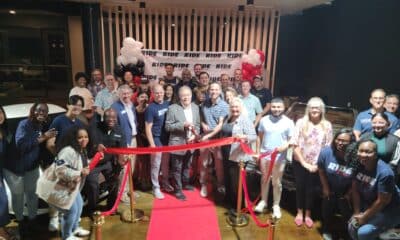Business
Capitalist Sage: How to Set-up a Cyber Safe Home Teleworking Office [Podcast]
Published
5 years agoon
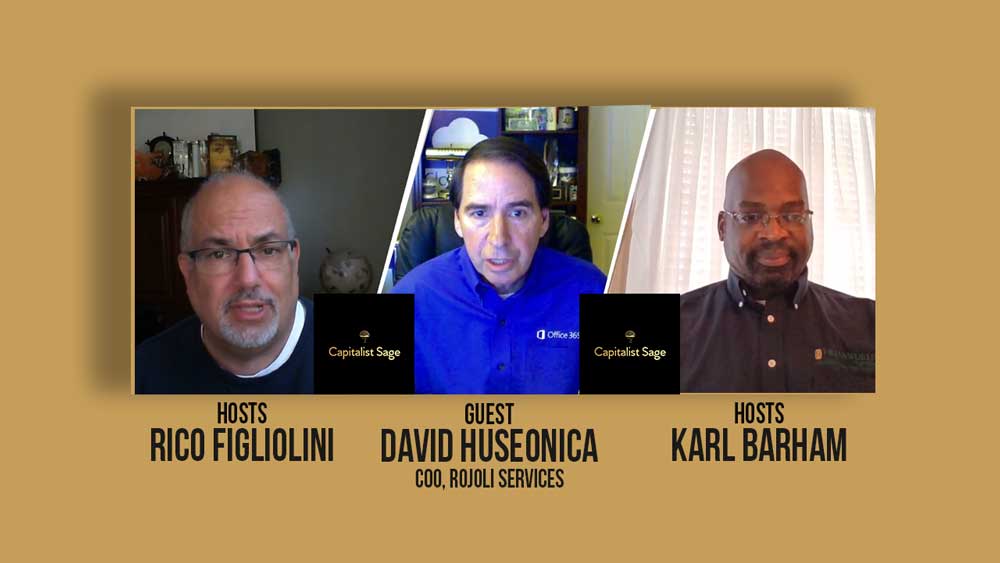
As we all get accustomed to online meetings and live-streamed classes, how do we find the same kind of IT solutions as we were used to in our business life? David Huseonica, the CEO of Rojoli Services is here with all of the answers we need to fix our home office workflow. Join Karl Barham and Rico Figliolni, and David in this episode of the Capitalist Sage as they discuss the IT solutions that will help you today.
Timestamp:
[00:00:30] – Intro
[00:03:37] – About David
[00:07:18] – Multi-factor Authorization and Security
[00:12:19] – Setting up Your Home Office
[00:21:18] – Remote Meeting Solutions
[00:28:53] – More Tools
[00:31:52] – Sharing Bandwidth
[00:38:59] – Get in touch with David
[00:40:45] – Closing
“I think there’s some silver lining to this dark cloud, is that some of the processes that we’re
David Huseonica
having to use today will have real benefits long term.”
Podcast Transcript
Karl: [00:00:30] Hello. Welcome to the Capitalist Sage Podcast. We’re here to bring you advice and tips from seasoned pros and experts to help you with improving your business. I’m Karl Barham with Transworld Business Advisors, and my co host is Rico Figliolini with the Mighty Rockets, Digital Entertainment and the publisher of the Peachtree Corners Magazine. Rico, how are you doing today?
Rico: [00:00:52] Good Karl. Hope you’re well. Hope everyone’s staying socially safe.
Karl: [00:00:57] We are, we are, we are adapting to the new world order and doing the best we can, help get through this. Why don’t you talk today a little bit about our sponsors?
Rico: [00:01:08] Sure. So I want to introduce one of our sponsors. A key sponsor actually is Hargray Fiber. They’ve been a big player here in Peachtree Corners and actually in the Southeast. So they’ve been in a lot of different cities like Lawrenceville and in and through the South of Georgia as well, they provide fiber optics to the business community as well as the consumer part. But the business community is really where they’re at. And as you can imagine now with everyone teleworking, this is a really big deal, which goes back to our guests today as well. But I want everyone to be aware that, you know visit HargrayFiber.com find out about what they can do, what services they can provide you, fiber optic services, and also about their rep promotion they’re running right now, which is free business incident for the next 90 days. So visit HargrayFiber.com/business and you’ll be able to see that and maybe take advantage of that.
Karl: [00:02:08] Who would have thought that the investments we’ve made over the last 30-40 years on fiber optics and internet capability is going to become so relevant and say, and as we’re making this grand shift into a different remote, technology-driven workforce in a way that we haven’t seen done almost ever. I’m really glad to have today’s guest, David Huseonica Is the CEO of Rojoli Services, a Peachtree Corners based IT and cloud service partner and providing collaboration as well as cloud hosting, helping businesses with business continuity and office management services for both small and medium size business. How are you doing today, David?
David: [00:02:53] I’m doing wonderful, Karl. How are you?
Karl: [00:02:55] Great. Great. Well, today we (want to talk about) having a role in what’s going on today in massive droves. People are moving to working at home as we are following the CDC guidelines and the government guidelines for social distancing. But I gotta imagine doing that, is bringing up challenges that small businesses and employees may not have thought of when they were thinking that they have to do a lot of their jobs from home. But I just wanted to spend some time exploring that with you today.
David: [00:03:34] That sounds great.
Karl: [00:03:37] Why don’t you start off with, just tell me a little bit about yourself, and how do you get into this business?
David: [00:03:45] Well, my background has been in IT and software and technology for 30 years and really kind of where we landed in this business today is, you know, years ago when cloud first started emerging. We really felt like it was a game changer and it was going to redefine the way that technology is used and deployed in businesses. And so we were early adopters of trying to learn, you know, how to leverage the technology, how to leverage it for business purposes. And, you know, it turned out to be a great bet because here we are today where, you know, it’s almost impossible to think about, you know, running a company, and doing the things that we do without leveraging cloud technology.
Karl: [00:04:33] Yeah. I mean, from the, you know, starting off with basic office services. I’m seeing more business implementing the internet of things, IOT strategy. So being able to manage data, flow, security, all these things has become a really important business consideration for a lot of folks. So, maybe you could tell me a little bit of, you know, since this has been happening, what are some, some of the things you’re seeing your clients, small businesses having to grapple with? And what are some of the things they’re doing that are you know, helping them manage this situation?
David: [00:05:13] Sure, sure. And if you don’t mind, I’d just like to, before I get into that. I just like to start off by, you know, offering my thanks and prayers to our nation’s frontline workers, who are essential in helping us push through this incredible situation. You know, all of us have family and friends who, because of our needs, must continue to serve the community, and many times putting themselves in harm’s way. And also like to have or ask everybody to pray for our nation’s leaders who are having to make decisions. You know, nobody was really prepared for, you know, the unique situation that companies are finding themselves in, you know, of having to make that transition from a working office to 100% remote work force in some cases has raised some pretty challenging concerns and, around technology and how you use it. And I think, you know, if I had to start anywhere, I think I would probably start in the, in the realm of a security. You know, how do you as a company, ensure that your, the data and the identities and the information that you’re needing to now access remotely, you know, is done in a secure fashion. And that, we’re not, you know, compromising, you know, information. And, so you know, what we’re seeing in our customers, first of all, one of our first recommendations is to enable things like multifactor authentication. Many of us have seen that in action with commercial applications that you use, where you go to log into a site and it sends you a text message or, you know, some other form of multifactor. And, and that really is probably one of the low hanging number one recommendations we can make for people is to, if their, if their solutions that they use for business, you know, have multifactor capability, enable that, make sure that that is on.
Karl: [00:07:18] Can I ask a question on that? I know on a lot of smartphones and different, they’re most companies starting to accent. Why is that so important? What is that doing versus what people conventionally do without two factor authorization?
David: [00:07:36] Yeah. Well the primary thing is that, you know, it’s beyond just a user ID and password to where it’s a private device that, you know, the good news is so far that’s been a protected type of set up to where, you know, people are not able to intercept those feeds. So it’s a, it’s another way of authenticating who you are, that your identity is truly who you say you are. And, and so if, you know, if multifactors are enabled it’s going to communicate with that individual through an alternative means. And, and again, it just reduces the risk that anybody could access your information, your systems without, having the proper authority to do so.
Karl: [00:08:23] Got it. Okay, thanks.
Rico: [00:08:24] Let me, let me ask you another question as well. I’ve been dealing with a couple of different companies that have all sorts of things going on right now. We’ve had to reset passwords on emails, sometimes just on the wrong things. All of a sudden they are getting a SharePoint email that’s not really from SharePoint. They think it’s an ad contract, let’s say when a contract, because their salespeople bless you at, you know, they want to get that sale. It’s that type of environment. Everyone’s started just clicking on things and she’s like, stop, stop doing that. How do you deal with that? What are you seeing out in the community when it comes to sales or operations of that sort remotely?
David: [00:09:08] Yeah. That’s, you know, the bad apples out there are seizing this opportunity. You know, even in good times, they’re at you all the time with these phishing emails, phishing a task, trying to get you to click on something, you know, and, and it’s, unfortunately, it’s even heightened in times like this. And so, you know, the recommendations that we have to avoid that. First of all, you know, if you weren’t expecting that, that communication, then you know, you need to double or triple verify that it’s correct. And, and, you know, the good old fashioned techniques of, you know, picking up the phone and calling somebody to verify, Hey Rico, did you just send this to me? You know, is really a great way of circumventing, you know, acting on something that is a scam. you know, we get these emails all the time about, you know, click on here to download a document or change your password. I would say don’t ever click on the links that are in the email, go to the website. So for instance, if a, if a service says that your password has expired, right? Rather than, you know, resetting it from the email, go to that services website and log in that way and see if it needs to be reset that way.
Rico: [00:10:34] Yeah. Well that would make sense to me. Cause if they’re going to send you an email and you probably have notification on the site itself. Get caught the wrong way. What about communications via like a VPN versus I’m doing it on, you know? So, some people think it’s too slow working on VPN. They just take things onto their own desktop or their own laptop, and then they bring it back up into someone’s server. What do you think about the workflow when it comes to that?
David: [00:11:04] You know, having, having remote access to files is vitally important for all of us in this mode. So, you know, having a secure way of getting to those files, and there’s multiple
technology strategies that you can deploy. To have that access, you know, VPN access into a file server on the, on the network. You know, it’s one method, you know, and at the speed at which this whole condition fell upon us. You know, not every employee was set up for VPN access from home. And, and so that has become, you know, a gap that many companies have been trying to fill in. But the fundamental guidance on that is, is that if you can avoid downloading, modifying, and uploading. Yeah, it’s better that way. If you have direct access to the files, either through a VPN or if you’re logging in through an office 365 SharePoint, one drive, which has two factor enabled, right. So that you’re having to do multi-factor, you know, in order to be able to get in and access those files. you know, that is absolutely the preferred way of doing it versus the uploading and downloading.
Rico: [00:12:19] You’ve had a company that, one of the companies that I think local here in Peachtree Corners that you helped set up. They’re, they work remotely. Is there special challenges to that setting? People’s home office infrastructure, maybe operating along those lines?
David: [00:12:35] Well, there are challenges and you know, again, speed at this came on us. Not everybody was set up the same way. So, you know, as far as home offices, first of all, our recommendation is if, you know, if you can avoid using your home computer to access corporate data you should do that. And the reason being is that if it’s a corporate device that you’re using, chances are it’s been set up a certain way there. You know, you know, many IT organizations are pretty diligent in making sure that, you know, the, the most up to date versions of all the operating systems are in play. That the most up to date versions of antivirus are loaded and active. And those are all things that, you know, traditionally will take place in, ahead of time. And, and so using, a corporate device is, is certainly typically more secure. If you don’t have that ability, then you know, you need to, you need to consider doing those same things for your home device. Meaning, you know, we all, we’re all guilty of it. We delay that Windows update or that, opposite day or you know, that antivirus update. I suggest you, you don’t do that and go ahead and make sure everything is current. Make sure you know, you have the latest and greatest, for that. And, and so that will certainly go a long way in helping protecting the underlying, you know, condition of the machine.
Karl: [00:14:04] When you, I know a lot of people they become complacent when it comes to those types of things because the corporate IT department automates so much of it. Now, as you get more disconnected, and let’s say someone worked for a smaller company where they don’t have a corporate ID, what can they do to help themselves secure their devices?
David: [00:14:27] Well. Yeah, so it’s a couple of things that we’ve already mentioned is, you know, ensuring that multifactor is enabled whatever you’re doing. Making sure that the office, you know, the, the windows or Mac or whatever OLS is, is updated and is current at the current levels and all the patches are applied. Making sure that your, the network, the wireless that you’re accessing is a secure wireless network, that requires, you know, secure authorization to get to it.
Karl: [00:15:02] Can, I can act on that point? For example, that’s one of the areas where most people on their home network get it installed and I don’t know that they checked it or they’re, what can they look for to know that they’re home? What would you look for to check if the home network was secure?
David: [00:15:19] Yeah. So the signal that you’ll receive will indicate whether or not it’s, so things like a hap or WEP or you know, enabled, which means that you have security turned on for that connection. And, and, and making sure that you’ve got a strong password. If you’re going to get onto the wireless, you know, don’t let it be your phone number. Don’t let it be, you know, other things that are easily, you know, determined by people outside of your, your, your home office. You know, so your neighbors or you know, literally somebody parked on the street in front of your home could potentially jump on your wifi network and get access to, you know, any other device that happens to be on that, including the, you know, the one that you’re on. So, you know, and you know, each of the wireless systems have slightly different things as far as how you configure it, but, just making sure that it’s secure, a password protection, connection that you’re, you’re accessing.
Karl: [00:16:20] I’ve got a follow up question along that line. As many especially smaller business freelancers, they use a lot of cloud sharing devices. You’ve got Google drive, Dropbox, all these different brands. Are those, are those okay for folks to use? For, for sharing documents and I know that different layers of security or what are some things they should be particularly cautious about when using those?
David: [00:16:51] Well, you know, again, secure, file share and access to files remotely is vitally important. And there’s a number of different brands out there. There’s some of the ones that you mentioned, you know, are, are very good solutions. We’re a very strong proponent of Microsoft teams and SharePoint and on One Drive, just because, we’re, you know, it’s, it’s, it’s the, the security around that has evolved to be where it is enterprise grade security that they have surrounding those. Not that, you know, those other solutions don’t have some levels of security, but, what I would suggest is that, you know, has come up with a standard for the organization. I would, I would say, you know, you’re much better off as an organization in the mode that we’re in today of saying, Hey for our remote files, access or sharing. If you don’t have other solutions, we’re gonna, we’re going to standardize on X and where we want everybody to use X. Because whenever you have two, three, four different applications that are being used by, employees, first of all, you know, ensuring the consistency of the security around those is very difficult. And, and also, ensuring that, you know, corporate data is not being shared, to people outside of the business in a fashion that’s going to violate, you know, corporate standards or compliance standards. So by settling on a single platform, you know that that will help you ensure that there are some levels of control because then you can begin to build in things like, role-based permissions. So if you and I, you know, we might have access to the same SharePoint site for instance, but we were able to control the files that you can access versus what I can access based on our role in the company. And that certainly goes a long way in helping making sure
that, you know, people are themselves viewing or sharing. It’s outside people’s information that should not be shared.
Karl: [00:19:05] Well, if I could shift a little bit and just start on understanding more. If you were to help someone, and I know many friends have set up home offices, when you start thinking about hardware and infrastructure and doing that and some of the things that you’ve seen people utilize effectively, are there things that you’d recommend for someone to make sure they put in place?
David: [00:19:30] So, you know, hardware, you know, there’s a lot of great brands, hardware. I would certainly stick with some of the, some of the better known brands from a hardware standpoint. You know, you know, from a configuration standpoint, if you’re able to, you know, for instance, my machine here, I’m home office, but you know, I’m not on my wifi. I’m directly connected into my router, via cable. So you even, you know, you do have the ability to, to do things linked up, you know, via cable versus always wifi. And so that, that would be something to consider. And a lot of times it has to do with, you know, where is the router coming into your home office located in comparison to where your computer is.
Karl: [00:20:18] Can I ask a question along that? So you just described something, I remember when Wifi wasn’t as prevailing as it is today, and people would have direct cable into their server. Is that a more secure method? If you are really concerned, you’re a financial professional or health care and you have some really high level, could hardware to allow you to direct line into your server be a worthwhile consideration?
David: [00:20:51] Absolutely. Absolutely. It just takes one more, one more layer out of the equation of how the, you know, what data it is flowing through. And, and so if you’re not having, everything is not going through your home office wifi, which again, can be potentially hacked. You know, if people have the credentials are sitting outside or other things, you know, it just removes another layer from the equation.
Rico: [00:21:18] Okay. When you were dealing with clients also that have to do like real time collaboration. You know, dealing with, you know, people out there on zoom. I mean, that’s not the only product you can use, obviously, where using something else that meant. For that topic, collaboration to submit more for broadcast, but how are you dealing with that? I mean, are you finding it easier for people to deal with it? Are you finding it becoming something that may become the norm after this?
David: [00:21:48] I think, I think there’s some silver lining to this dark cloud, is that some of the processes that we’re having to use today will have real benefits long term. You know, you had mentioned one of our clients that we’ve helped enable, from, a remote workforce standpoint. This is a, you know, a software development company that was high on collaboration. I mean, literally they were doing huddle meetings, you know, all day long, looking at code together, you know, having meetings, onsite and remote personnel. And so, that’s a, that’s a scenario where
we were able to deploy with them a product. And this is again, the Microsoft solution, Microsoft teams, which includes all the tools under one platform that allows them to do that so they can do, you know, chats, real time, chats back and forth. And you can do voice calls between each other. You can do video conferencing like we’re doing here. It has file sharing, a secure file sharing, so you can store your files and have access to it. And you can, you know, do, do all the things that a highly collaborative environment really needs, and you get it all underneath one brand or one label. And you know, I’m not saying that’s the only one out there. I’m just saying that is one that we have deployed, not only for those folks, but at a time and time again. We have, I think across the board, we’ve got about 175 companies that we work with customers, and I’d say a 75% of them, 80% of them have deployed a solution like that. And the good news is many of them there were already, you know, somewhere down that road before this, this hit, which gave them really a leg up and being able to. be able to respond to this as quickly as possible.
Karl: [00:23:39] So I have an interesting insight in that. I worked for a lot of years in large corporations and so Microsoft teams and some of these tools are available when I talk to small business owners, a lot less of them are familiar. So you’ve used a couple of terms. Can you describe for instance, what would be in the tool belt. Well, someone new collaboration that might be there. So like the example, what exactly is Microsoft teams and what does that do? And are there one or two other tools like that you think people may want to get familiar with?
David: [00:24:15] Yeah, so what Microsoft teams is, is really Microsoft’s collaboration. It’s a platform that is comprised of multiple pieces, multiple solutions. So, you know, it allows you and I right now, even though we’re looking at each other through the video, we could be chatting with each other offline. So I, I, you know, and that’s great for, if I just need an answer from Rico, I don’t want to necessarily have to call them or wait for an email response. I can, I can see that Rico’s online. I can ask a question and get an answer right away. So that real time chat capability is…
Karl: [00:24:52] Is that kind of like texting for somebody for an ed that would be used for an immediate response? You throw out a question and anyone on that chat can respond back quickly.
David: [00:25:02] Exactly. So you could do one on one, you could have groups. And so a way of, you know, again, collaborating, getting real time, you know, answers very quickly. Versus having to, you know, in, in an email mode you send it, but you don’t know that the person’s there or not. And this, this gives you that presence capability.
Rico: [00:25:22] You know, I want to ask you something because I’ve worked here in my teleworking out of my own office. My dining room was right there. My son, my high school kid is on a dining room table with his laptop doing his work. And I feel like we’re all in a fraternity house doing work. But when I passed by his laptop sometimes, and I talked to him about what he’s doing, I see this younger generation, I don’t only see doing the digital learning in their portal
environment, but he also has discord open, which is one of these chat type places with your friends, it’s mainly used for gaming and other things. Do you find any intergenerational, generational issues with people getting online and being able to do the work? Do you see any challenges there from your point of view?
David: [00:26:12] Well, you know, the younger generation, you know, the millennials and around the millennial, I mean, they certainly are more adept to these types of tools. And maybe some of us older folks are, I put myself in the older folks category. So yeah. Isn’t really something they grew up with. It’s something, you know, my, my, my parents now are finally texting. But it’s, you know, here we are in year 2020, and, you know, it’s just taken a long time for him to get to that point. So, you know, the younger generation grew up in a fashion where they’re. they, they’ve had these immediate communication protocols that they’ve been able to leverage, whether it be texting or, or chatting. And, you know, you know, a lot of this didn’t come out of the gaming environment to where they, they did this way before businesses, you know, really adopted these, these solutions.
Rico: [00:27:08] And I see creeping into business sometimes too, cause some younger employees don’t want to be on video camera. They’d rather just be, you know, do the audio, you know. But of course the upper management wants to see everyone on video cause it’s one way of keeping in touch and one on one and all that.
David: [00:27:27] Yeah. And I think there’s some, there’s definitely some value in, in doing that. I mean, like for instance, in our company we have a daily all hands meeting and a, and you know, when this all all came about, you know, we were, we would all be in a conference room together looking at each other. And then all of a sudden, you know, this cloud came over us. And, and now, you know, we began those where we were just, you know, voice only. But we began to turn on our videos too, as a way of, you know, particularly in the mode that we’re in, giving people that extra you know, social capability of, you know, I can show you something in my office if I need to or pick up, you know, so, you know, I think, I think that’s good. And the good news is these platforms like, you know, Microsoft teams and there’s others, you know, they, they allow you that, that, that extended level of collaboration that could go from chat to voice, to video to, you know, you and I can be, sharing a document right now, and both of us working on that exact same document at the exact same time, versus me having to, you know, do my work and then say, okay, Rico, take it over here. It’s yours now. And then you have to do your work. And then we have to figure out who did what. So these platforms have really accelerated that whole collaboration and it gives you an option as to what’s the best way to do it for that need and that team.
Karl: [00:28:53] We’ve got a couple of others. You mentioned in the SKUs chat as a tool. You talked about file sharing, and in that example with Rico where you could do live updates or two more, more than one person can do that, what’s the tool that facilitates that kind of file sharing?
David: [00:29:10] Yeah, so, that kind of file sharing is baked into a SharePoint in one drive, as an example. And a what, what people, the term for that is co-authoring. And, and so when you look at, you know, being remote. Trying to work with multiple people at the same time. You know that that’s a, that’s a feature that, you know, whatever platform you go to, you should probably consider, does it have that co-authoring capability? So you know, what that does is it, it basically gets you out of this a serial mode where, you know, I’ve got to do my work and then, then you can do your work, and then Alice can do her work. And, and so, you know, this allows all three of us to be in the exact same document. So we can have a word document, excel sheet open at the same time, and I could see where you’re working and as you, as you’re typing and you’re making updates, those would show up on mine. And I’m working in a different area of the document or the different part of the Excel sheet. So, you know, it just, greatly enhances that whole collaboration experience.
Karl: [00:30:17] So, I’ve got this video collaboration. I’ve seen more Skype, zoom, go to meetings, all of these platforms, people using some, well, some not so well. Tell me a little bit about platforms for that and, and some things that people can do to be, do you use those effectively? What’s the use case for that?
David: [00:30:45] Well, first of all, you know, there’s lots of good, good ones that are out there. The ones that you mentioned. You know, you know, have, have strong followings. You know, again, Microsoft teams has that built into it. So that’s the one that we standardize on it. But the most important thing I believe is that, you know, people have to get comfortable with using the tool. You know, there’s, you know, there might’ve been 10% since the company prior to a month ago that ever started and managed a video meeting, you know, web comms, meeting, screen share chat, voice video. Maybe 10% now that that 10% has gone to maybe 75% of your company needs to know how to do that and, and so that, that other percentage needs to be trained or maybe people need to be retrained and, and actually how to use it effectively and so that they are you know, able to conduct the meetings and collaborate the way that you want to.
Karl: [00:31:52] So does a currently the secondary on that follow on. So in the video I’ve noticed people struggling with video that’s doing a lot of demand on bandwidth versus what they might’ve done before. Are there tips and things that people can do to be able to conduct more of these media? Imagine four people in a household. Well doing a video meeting today because the husband, the wife, and both kids are all on some form of video. What can I do or what are some of the tips you might have for someone to be able to manage that? Or should they all be on it? Should they, so they change different resolutions? Any thoughts?
David: [00:32:34] You know, a lot of it has to do with the bandwidth, you know, starting from the street, coming into the house. So if you, depending on the carrier that you have, you might have certain bandwidth that they’re, that you’ve signed up for, you know, whether it be, you know, Hargray or whether it be Comcast or somebody like that. So, you know, that will certainly impact how many of those types of things you’re able to do concurrently. Then you have, you know, capability within the four walls, such as, you know, your wifi and, and the type of, you know,
bandwidth that has and capability. You know, you need to also, people need to have diligence. And matter of fact, you know, before this call, my daughter’s upstairs doing her homework, which has a lot of video. And so I just asked her, I said, Hey, I’m going to be on an important meeting here. Can you just hold off streaming for a little bit in the event that it does collide? But you know, the reality is you’re probably not going to know if four people can do it at once until you try it once or twice. And, and you may want to try that in a, in a mode to where it’s not going to disrupt you know, the other people and which is one of the advices we give people is that, Hey, if you’re going to start using things like web conferencing and video conferencing, and all that is, is try it out ahead of time. You know, get on it. Get somebody, you know, comfortable, a friend, family member, you know, with you. Make sure that the quality is there because you might have to make some adjustments either for your own home office technology or you may need to call your provider and say, Hey, I need to go from a hundred Mg to a gang type of bandwidth.
Rico: [00:34:21] You know, it’s interesting cause the, your zoom for example, is throttling a little bit on how they are streaming the video too. So they, depending on your membership with them or your package with them, you might be only doing it at 760 or something like that versus something higher. I don’t know about you all, but like for example, in my house we have, I typically have a 250 package. It’s like whatever the fastest packages we have, and I have four or five people online all the time doing stuff. And yes, I have 2,500 people through Comcast Xfinity went out. And we were out for an hour and a half. So everyone comes down to see me, to say I’m the IT guy. It’s out 2,500 people in Peachtree corners. That’s a spot somewhere. Shows it on the map, but everyone has the, you know, the data plan we have on our tablets and cell phones. Yeah, hot spot. That’s what we did for that hour and a half, we hot spotted this stuff. Granted, some of it could be low bandwidth, but there’s ways around some of that, I think.
David: [00:35:28] Yeah, that’s a great point. Rico, and you know, having an alternative, you know, it’s certainly something I always want to, you know, keep in back of your mind is that, you know, what, if this does break down, what am I going to do next? It was just like, like in the old days, whenever you’re doing a, you know, many people on this call or I don’t remember, but she had the, the projector where she put the transparency on, you know, in the meetings and, you know, and, and so, okay. What if the, what if the bulb on that projector went out during your meeting, you know, how are you going to continue, you know? Well, you know, that’s where you say, well, I also brought a hard copy that we can all pass around and, and go off of, you know, so they’re, they’re, you know, thinking through it a little bit. Certainly it helps to make sure that we’re doing.
Karl: [00:36:14] There’s one thing along that line, just the difference between how much data video uses versus audio. A lot of times, if everyone is streaming Netflix, running meetings, video meetings. There might be times where the right application is just an audio.
David: [00:36:33] Yeah.
Karl: [00:36:34] But you can almost, you can be full into videoing everything and you’re throttling bandwidth when, you know, for a period of time, you might say, look, maybe you go on audio only and you stop streaming the video. And then, you know, if you have a bandwidth problem, you can toggle some of that stuff.
David: [00:36:51] Yeah, that’s right. And you know, some of these tools do have the ability to where you can, you can choose to accept video as well as broadcast video. So, you can either or those. So, you know, being mindful that, you know, video is going to eat more bandwidth. There’s just no two ways about it.
Karl: [00:37:11] You also mentioned different plans. So I’m not familiar with all of them in particular. But, you know, the, the giga and the, how much bandwidth in this, in this next 60 day period with all the homeschooling and other things that are going on. What types of bandwidth do you think people would be safe with if they had, just so they have an idea they’re way below and they may need to be investigating. They’re talking with the providers.
David: [00:37:42] Yeah. You know, each case is going to be different, but I would say, as much as you can get is an easy answer, you know, but, you know, we, what we did personally in our house is we were, I think at about a 200 Mg type of plan with, with our provider. And knowing that we’re all going to be here and also did some other things with, with moving over to a streaming TV. You know, we just said we’re going to go up to get bandwidth and, you know, in the, and the increase in costs. While, you know, money is certainly important. You know, it was surprisingly inexpensive to make the jump. And, and so, you know, thinking about, you know, what is the alternative. You know, spending an extra, you know, 20 bucks a month for this. Is it the fact that my productivity and I can’t do the meetings, I can’t do all the work? You know, it seems like a pretty good trade off. And again, I’m not, not minimizing that. And, you know, money’s important, but, but so is productivity these days, so sometimes you have to sacrifice a little bit for higher productivity.
Karl: [00:38:59] I know that there’s a lot more we can talk about and, and just wanted to ask if people you know, had questions and wanted to reach out to you and, and your company, how would people get in contact with you?
David: [00:39:13] Yeah. So, again, we’re, we’re located right here in, Peachtree Corners in, Technology Park. And specifically, if you’ve heard of Curiosity Labs, we’re one of the tenants in that building, we have, you know, obviously a website, www.Rojoli.com. And, you know, our phone number and everything is listed on there, or you can just contact us at sales@rojoli.com. And I’ll, I’ll just, also make mention, you know, with the times that we have today, you know, in the situation going on, we have come up with some, what we, what we’re calling them is COVID-19 ITU relief packages, which are you know, services that organizations are faced with right now. That, you know, they, they need to adopt and they need to do it as cost effectively as possible. So we’re offering a number of different free services, such as migrations to office 365 for people who need to take advantage of that platform and teams and, and, disaster recovery
solutions and, and some other things. So, those are, we’re trying to do our part as a part of this to help, particularly SMBs, which are small, medium size businesses where we live, you know, get the technology that they need in order to continue running their business and also protect their data. You know, during these trying times.
Karl: [00:40:45] Well. I really want to thank you so much for spending some time with us because, I know people are talking about relief packages and people are talking about testing and social distancing, but this, this behavior shift that’s happening across industry where people are now, we’re working more remotely. We’ll start to unveil opportunities for people to do things, over computers and networks and just starting to think about it and make sure you harden yourself, is really important, but the tools that you outlined. Chat features, file share features, video software, et cetera, or new tools that we all can start using to maintain productivity at home. And in a lot of cases, this is now how our kids are learning for a few more months. So becoming familiar and comfortable with that is going to be really important as we navigate, beat ourselves to this, pandemic. So, we would like to thank David, for joining us today and talking about this and we definitely recommend people take advantage of some of the offers his company is doing. The Rojoli service is right here in Peachtree Corners. We’re trying to help each other. Businesses are stepping up to provide the tools for people to be successful through this. And I want to thank you and what your whole team is doing to help with.
David: [00:42:20] Well, thank you for having me on today and I’m looking forward to the other side of all this for everybody. Thank you.
Karl: [00:42:28] Amen to that. Well, we wanna thank the community for doing everything they were doing. Rico, I’d say social distance saying is being taken seriously here in our local communities. If you, if you go about, you see people taking it seriously and everyone that’s doing that is helping to make this go quicker and save lives. So we appreciate that. And the sooner we can get this under control and get back, to, to our normal activities, play and work, the better. Also wanted to, just mention we’re going to continue to do our podcast. We have guests that are coming in, and hopefully this format is working, but you could hear us on streaming on your local streaming service, the Capitalist Sage podcast, as well as we do post this live on Facebook. And what’s the, where would they find us online Rico?
Rico: [00:43:28] Sure. So go to LivinginPeachtreeCorners.com. you can also find the podcasts if you go to Apple podcasts, iHeartRadio, Spotify, SoundCloud, any of those platforms has Google or just search for Capitalist Sage. And you’ll see the podcast there. Even if you Google Capitalist Sage podcast, you’ll see it online. It’s on YouTube. So this video will be on YouTube as well. So any of those places you can find.
Karl: [00:43:54] Awesome. Well, I’m Karl Barham with Transworld Business Advisors of Atlanta Peachtree. Our business advisors are available to help people navigate through this.
We help people with buying and selling businesses, advising them how to increase value, and in this time, just making sure they’re able to survive through this, if not thrive in the future. And Rico, I know we have some stuff coming out.
Rico: [00:44:19] Sure. In fact, I should say that in the next four or five minutes, I have another podcast. We’re doing Peachtree Corners Life, and I’ll have the head of school for Wesleyan with me. We’re going to be doing talks about distance learning and going through that. So it will be sharing this podcast space shortly with that. So, but this hit the mailboxes or will hit the mailboxes. Today, tomorrow, tomorrow, Peachtree Corners magazine. You’ll find 21 different restaurants you can do your orders from for go-to or curbside pickup. Stories on digital learning, local schools, stories on faith, how the churches are reaching out to the communities online through zoom and other, other, avenues and a whole bunch of things like that as well. If you need any, any services when it comes to content marketing or podcast production or anything along those lines. Mighty Rockets is my company and we are more than happy, more than welcome to contact me. Rico@mightyrockets.com
Karl: [00:45:22] Thank you again for everyone for tuning in. Have a great day.
Rico: [00:45:25] Thank you everyone.
Related
Business
The City and PCBA Welcome Ride Lounge with Ribbon Cutting Ceremony
Published
5 days agoon
June 4, 2025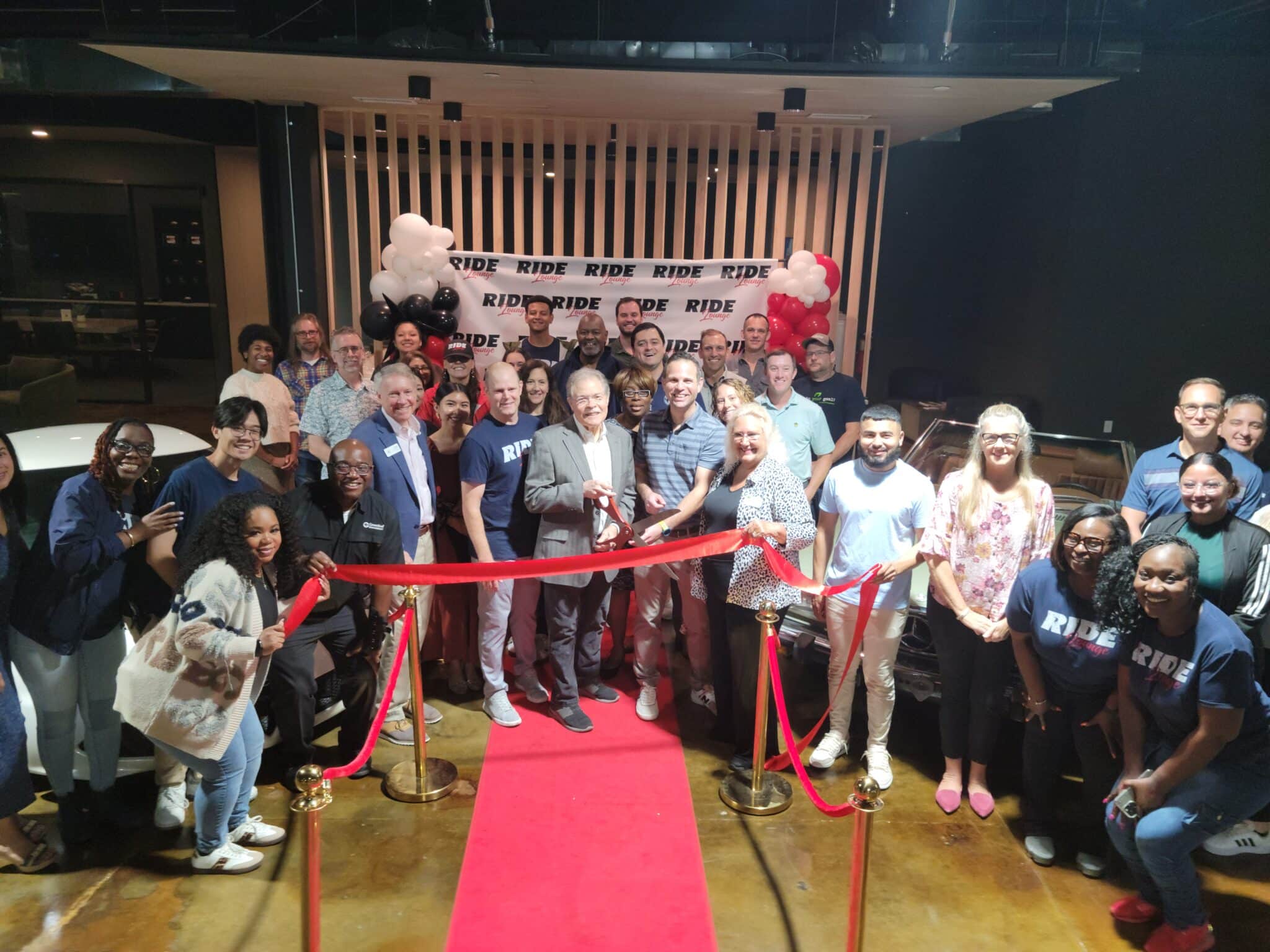
The Peachtree Corners Business Association and the City of Peachtree Corners officially welcomed Ride Lounge, one of the city’s newest businesses, with a morning ribbon cutting ceremony on May 29.
From 9 a.m. to 10:30 a.m., members of the city and PCBA, along with members of the community, enjoyed mingling, getting to know the Ride Lounge staff and learning more about the unique company.
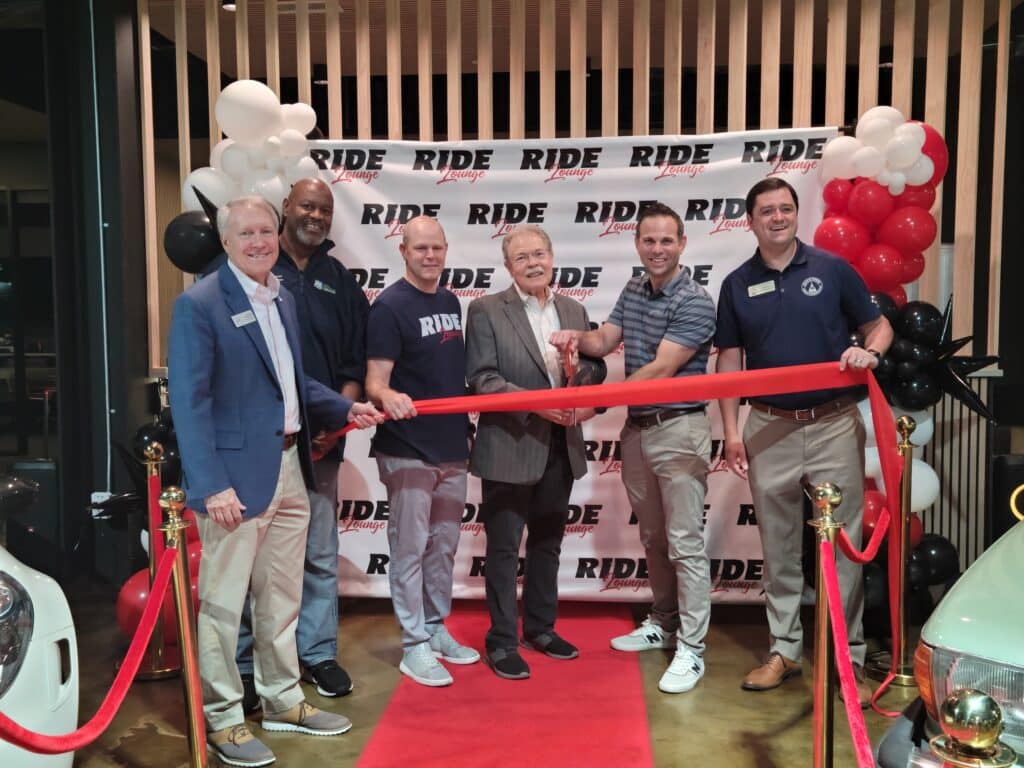
Guests also enjoyed a light breakfast spread of bagels, fresh fruit, coffee and juice and brief speeches from featured guests.
Welcoming the business
Lisa Procter from the PCBA spoke first and thanked Ride Lounge for being part of the PCBA and the Peachtree Corners community. She also recognized the collaboration between the organization and Ride Lounge in hosting the ribbon cutting.
“The PCBA was proud to coordinate with Ride Lounge and the community to make this event a success,” Procter shared.
Mayor Mike Mason followed Procter in addressing the crowd and talked about the state of business in Peachtree Corners and how companies like Ride Lounge help make the city a great place to live and work.
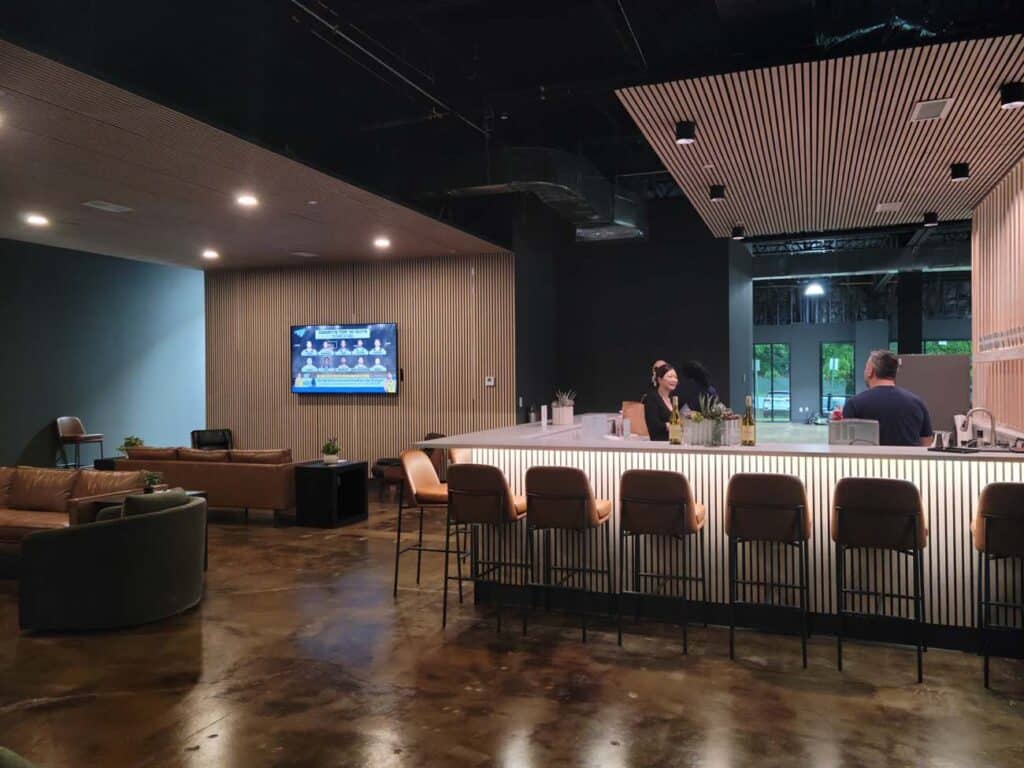
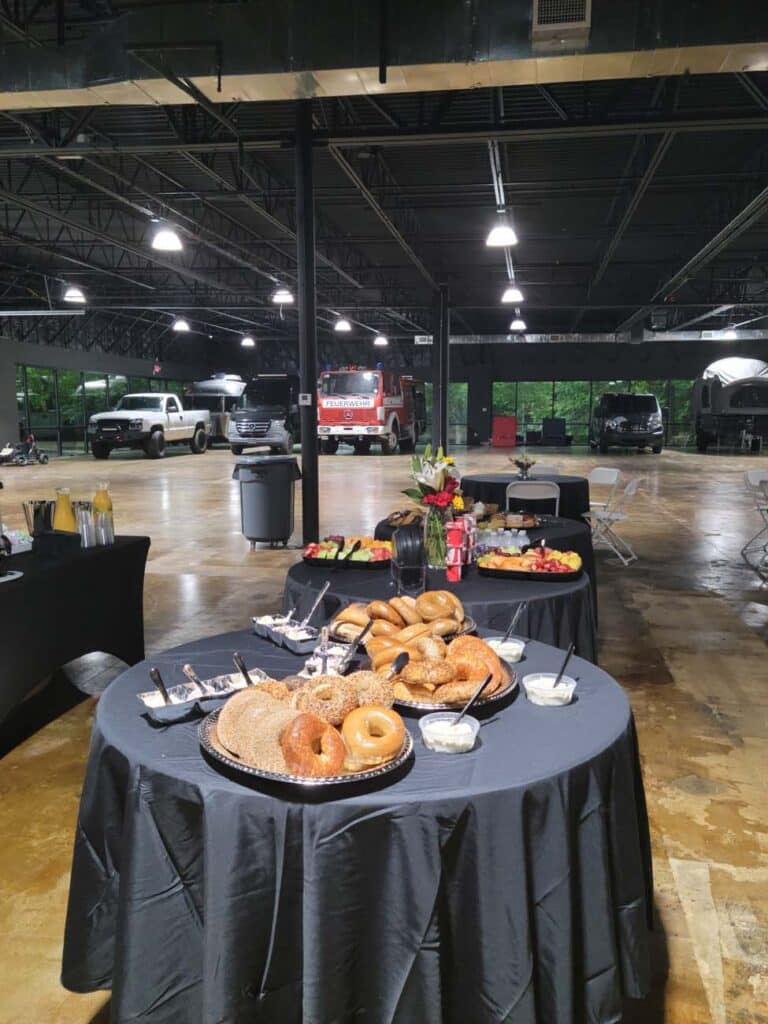
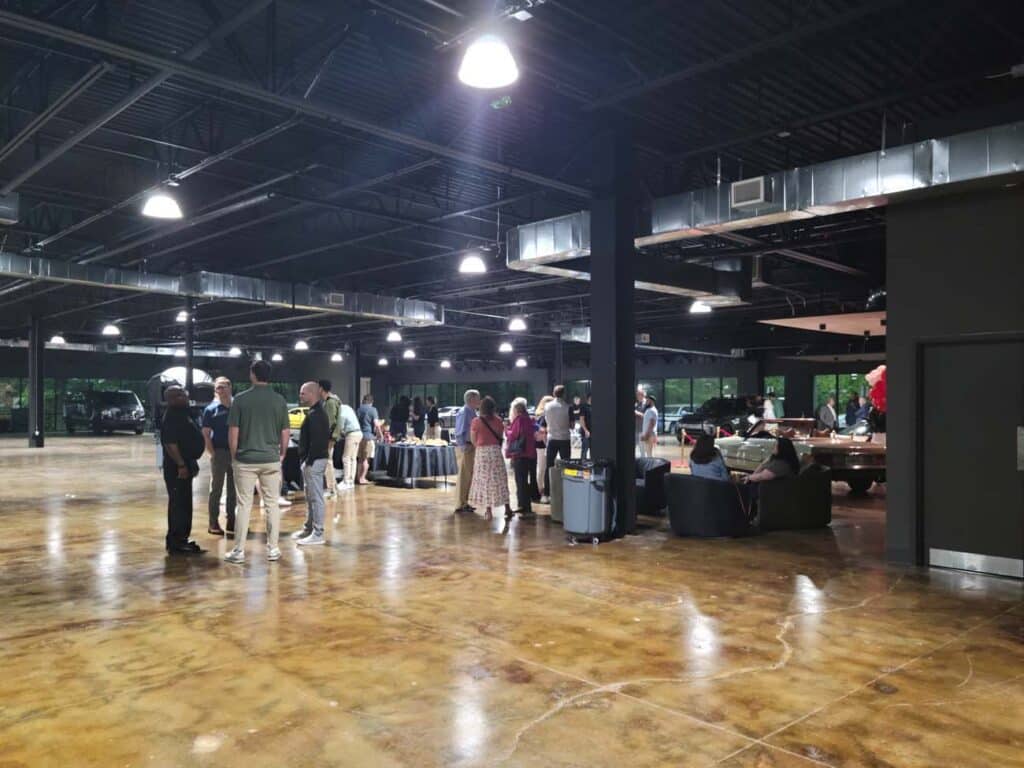

Dave Codrea and Josh Friedensohn, founders of Ride Lounge, then thanked everyone for coming and shared a little about the company and their vision.
The cutting of the ribbon and photos followed the brief speeches. Afterwards, the crowd was invited to tour the space and spend more time chatting and networking.
About Ride Lounge
The Ride Lounge is more than a car storage facility, it’s a place that celebrates car culture; where car enthusiasts can meet to discuss their passion and show off their vehicles.
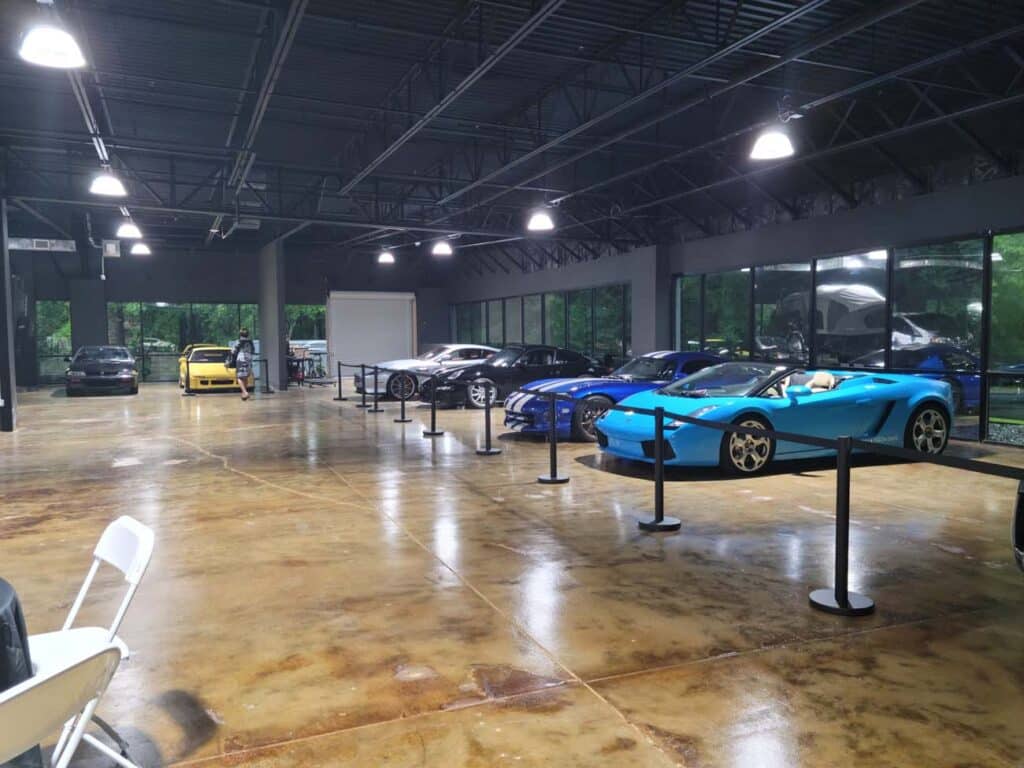
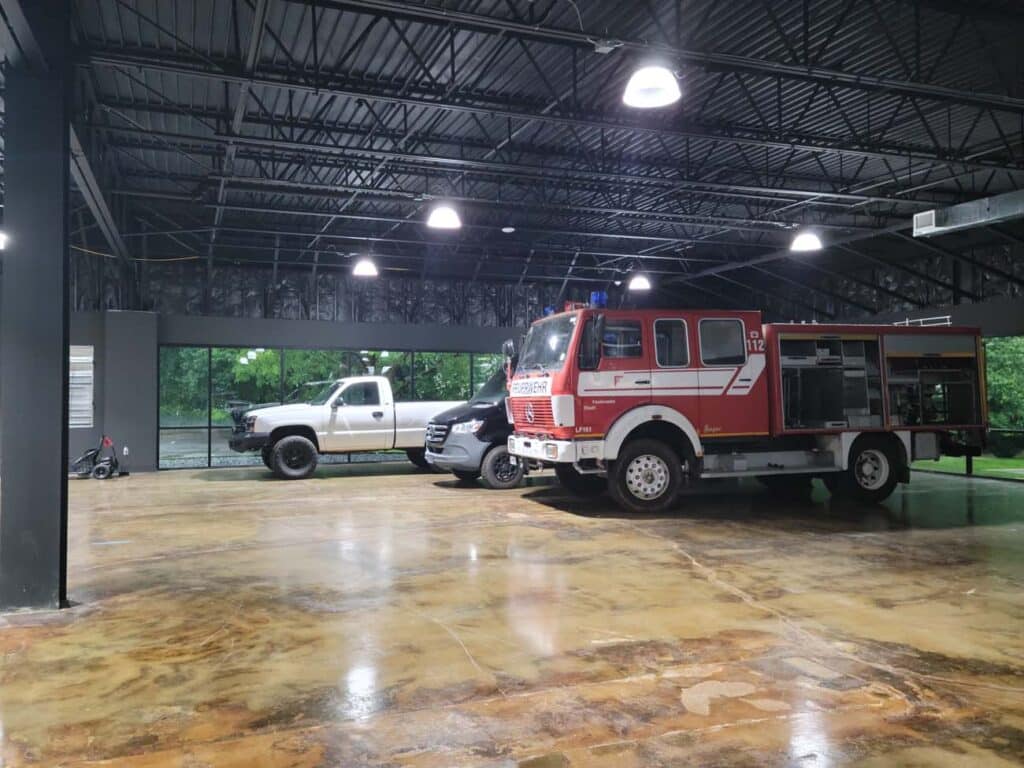
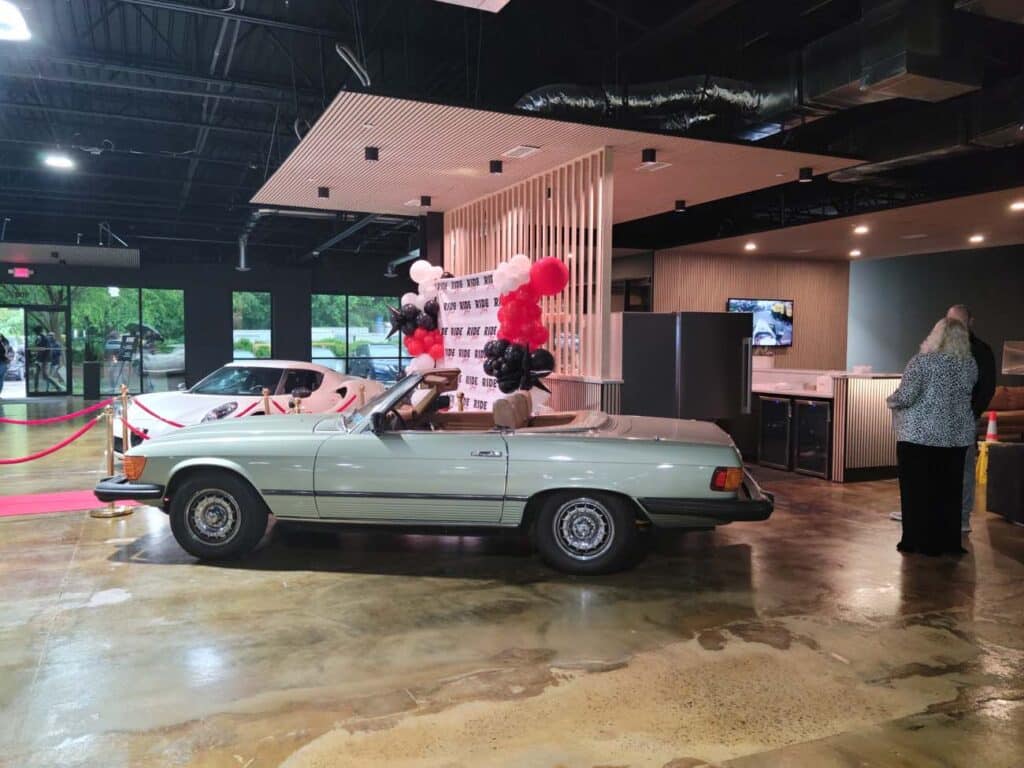
Founders Dave and Josh wanted to create a welcoming community that people would trust to store their vehicles, but that would also offer a club-like atmosphere and host fun, car-centered events that the whole family could enjoy.
Ride Lounge’s 20,300-square-foot facility is comprised of 58 parking spaces with the potential to include car lifts in certain areas. There are cozy seating areas, a meeting space and kitchen area so members can hang out, relax and talk cars.

Designed for cars that are driven and enjoyed by families, Ride Lounge has room to hold up to 400 people for special events and activities.
To learn more about Ride Lounge, visit ride-lounge.com.
For more about the PCBA, visit peachtreecornersba.com.
Related
Business
Music Matters Productions Expands Peachtree Corners Headquarters
Published
3 weeks agoon
May 21, 2025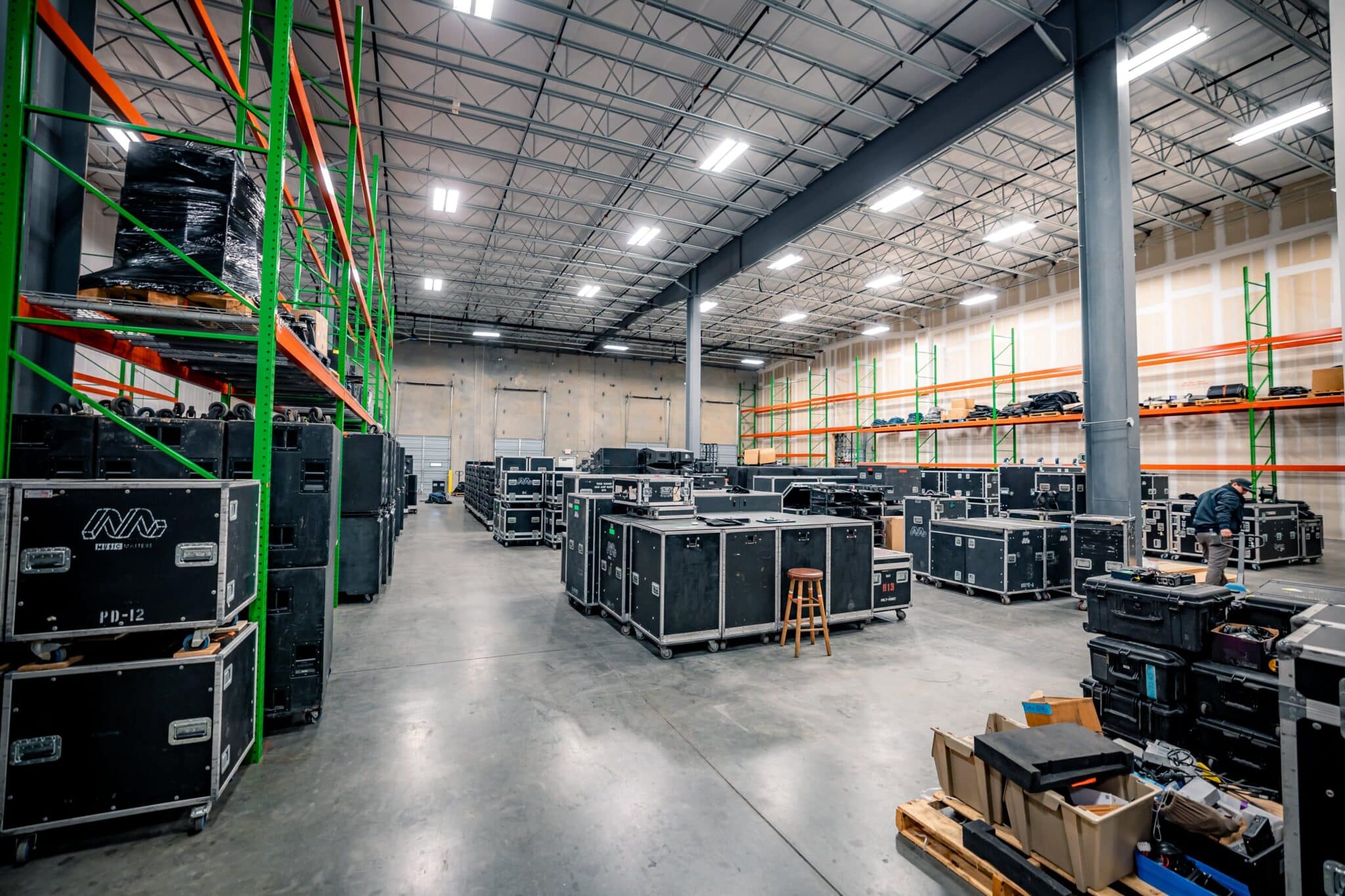
Company adds 20,000 square feet to meet growing demand
Music Matters Productions (MMP), a premier provider of audio, lighting, video, staging and rigging solutions, has expanded its metro Atlanta headquarters, increasing the total warehouse footprint from 40,000 to 60,000 square feet.
In addition, MMP has opened a second 10,000-square-foot building directly across the street to house its growing corporate production division.
The expansion comes in response to increased demand across touring, festival and corporate markets, as well as the continued growth of MMP’s high-end gear inventory. With a fully dedicated shop for each department, including audio, lighting, video, rigging and staging, the new layout provides more space for show prep, pre-rigging and crew coordination, allowing for even more efficient load-ins and streamlined execution.
New features
The rigging department now features a new mobile motor hoist test stand, allowing for in-house motor certification, a service that’s now available to external clients in the production community.
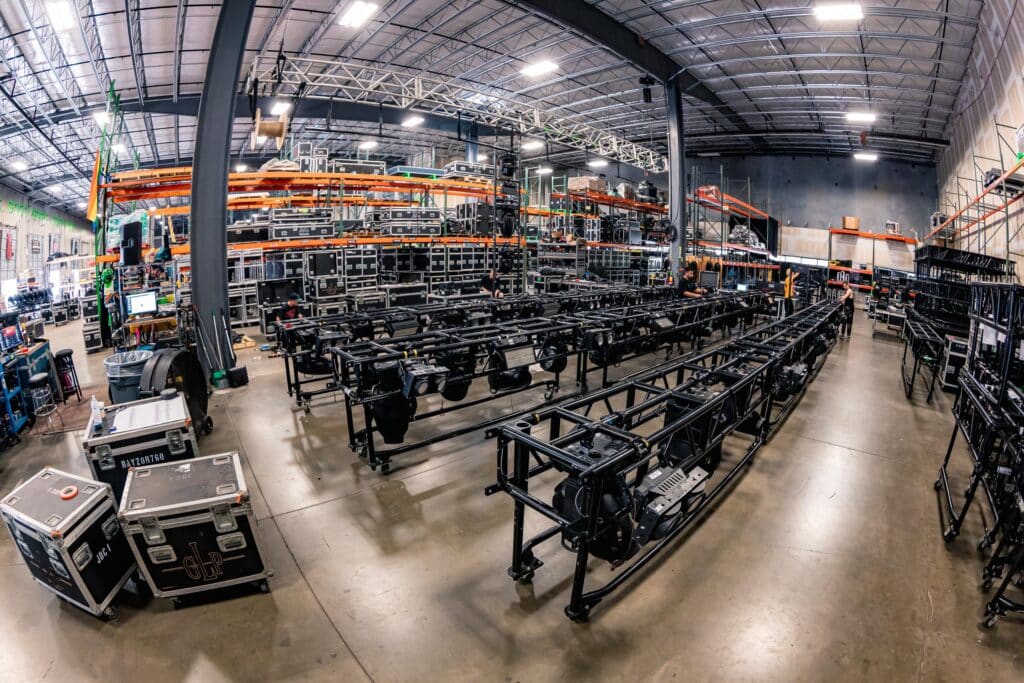
Five new truck bays were added in the process, as well, bringing the total number of bays to 17 — an important upgrade for MMP’s fleet and the increasing number of shows moving through the warehouse each week.
“This growth is a direct reflection of the work our team puts in and the trust our clients place in us,” said Aaron Soriero, owner of Music Matters Productions. “We didn’t expand for the sake of being bigger, we expanded because we needed the space to do the job right. More room means tighter prep, faster turns and better support for our clients.”
Expanding operations
The expanded warehouse and building across the street include additional offices, mixed-use areas and a dedicated repairs department, giving the team more capacity to prep, collaborate, QC and scale for increasingly complex events — both corporate and entertainment.
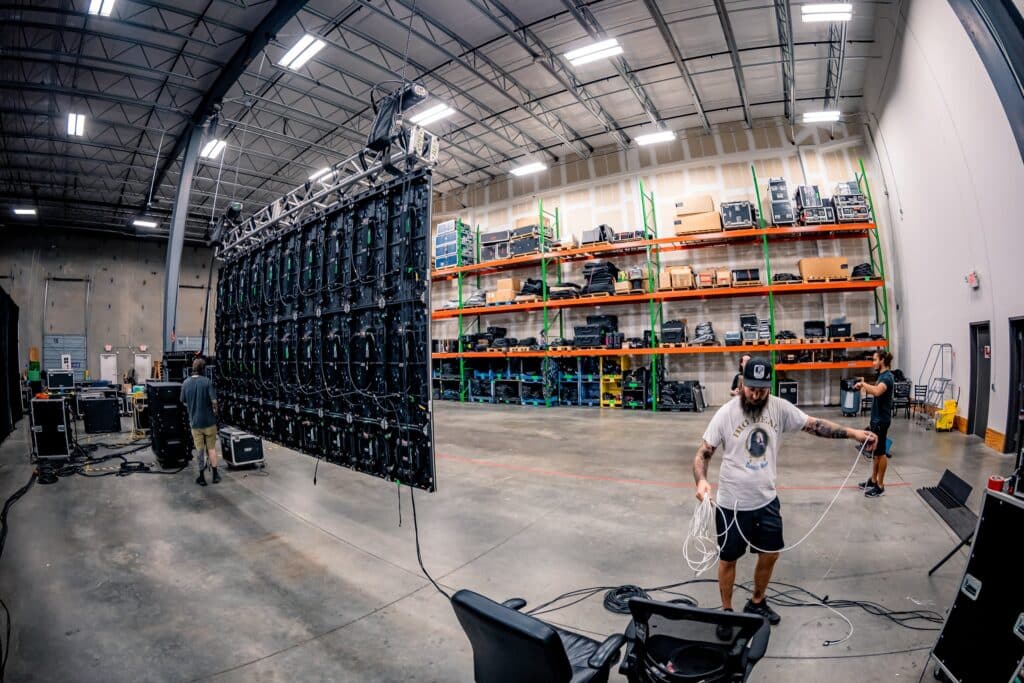
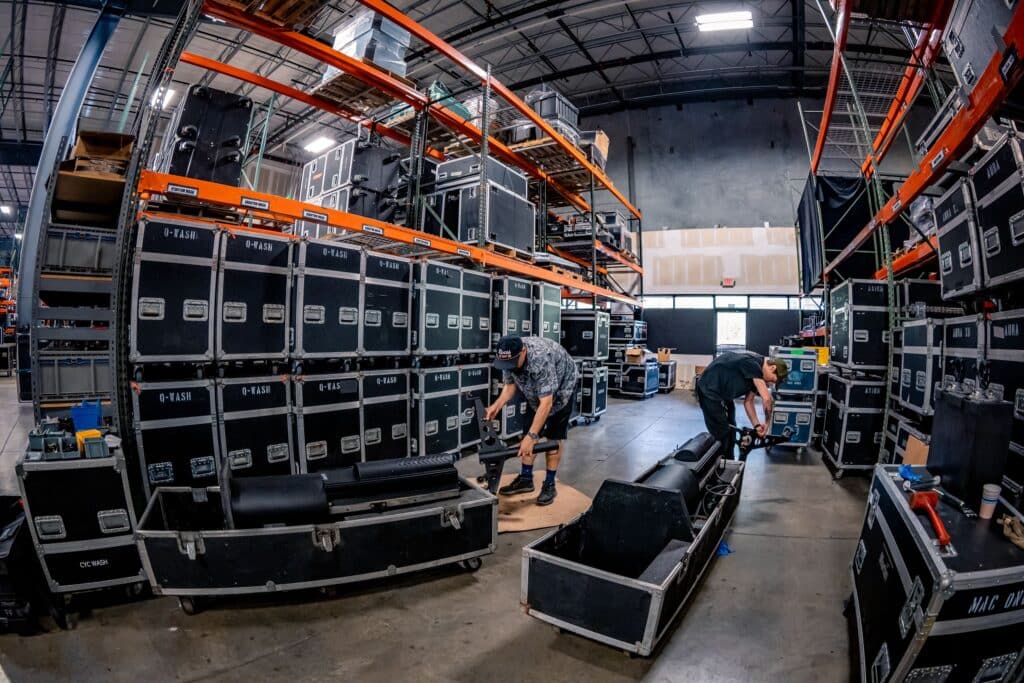
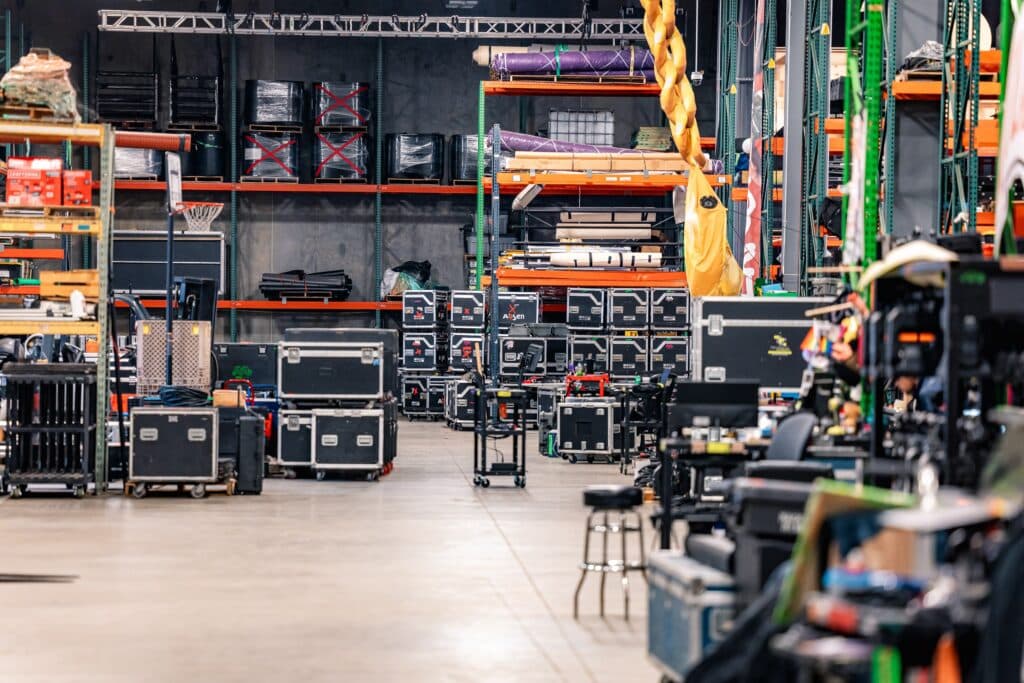
With a reputation built on reliable gear, experienced crews and an enhanced client experience, MMP continues to solidify its role as a go-to production partner for events of every size and setting — whether it’s a beachside festival, a stadium tour, brand activation or a high-stakes corporate show.
About Music Matters Productions
Music Matters Productions is a full-service live event production company based in Peachtree Corners, Georgia, providing industry-leading audio, lighting, video, rigging and staging solutions for tours, festivals, brand activations and corporate events across the country.
Known for its high-end inventory, seasoned crew and deep dedication to doing the job right, MMP supports hundreds of productions each year and is trusted by clients nationwide.
For more information, visit mmp-atl.com.
Related
Business
From Boardrooms to the Himalayas: Vandana’s Journey to Purpose and Growing with Intention [Podcast]
Published
3 weeks agoon
May 19, 2025
How one family blends operational clarity, conscious leadership, and community-driven values to grow their business — together.
In this episode of UrbanEbb, host Rico Figliolini chats with Vandana Aggarwal, VP of Operations at Aggarwal Real Estate, about the winding road from global consulting to family-run commercial real estate in Norcross, Georgia. With honesty, warmth and insight, V shares how she went from working 80-hour weeks in corporate strategy to rediscovering clarity in the mountains of India — ultimately helping transform her family’s business into a community-driven real estate firm managing over 50 shopping centers.
The conversation weaves together themes of leadership, legacy, operational excellence and the transformative power of both AI and yoga. It’s a story about clarity, courage and conscious growth — both in business and in life. This is another episode you won’t want to miss.
Episode Highlights
- Why Vandana left a high-powered consulting career to join her family business
- How hiking Kilimanjaro and studying yoga in the Himalayas changed her leadership mindset
- The operational overhaul she brought to Aggarwal Real Estate to support growth
- What it’s like working side-by-side with your dad, siblings, and 700+ tenants
- How the company rebranded with intention and built a mission around “building communities as a community”
- Where AI is reshaping real estate—from lease drafting to property management—and where it still can’t compete with people
- Leadership succession planning with siblings at the helm
- The importance of clarity, calm, and conscious growth in both business and life
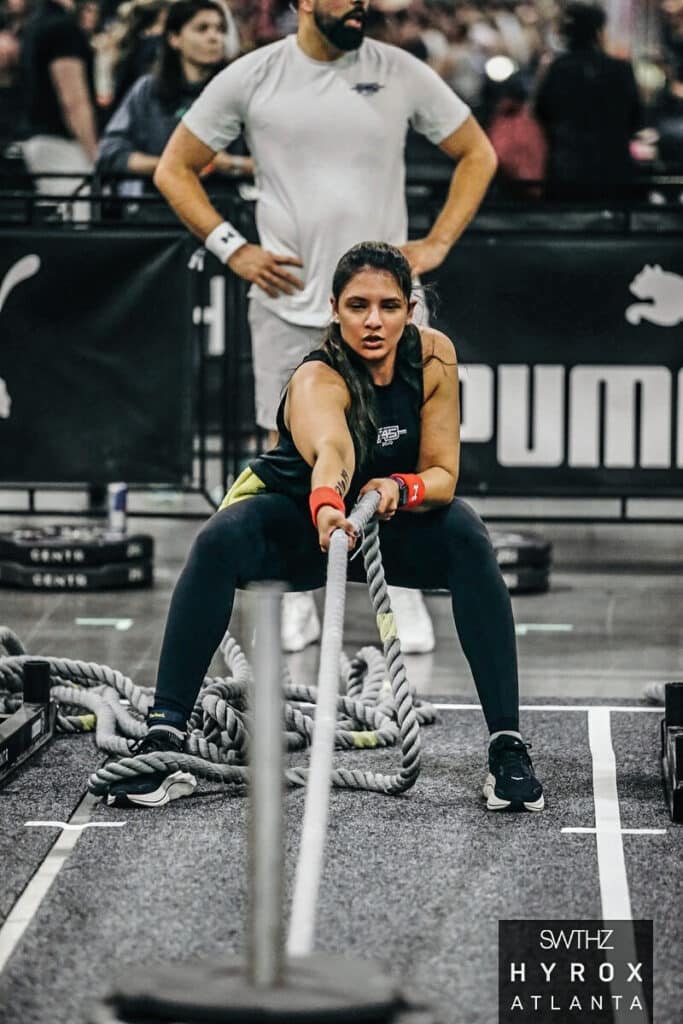


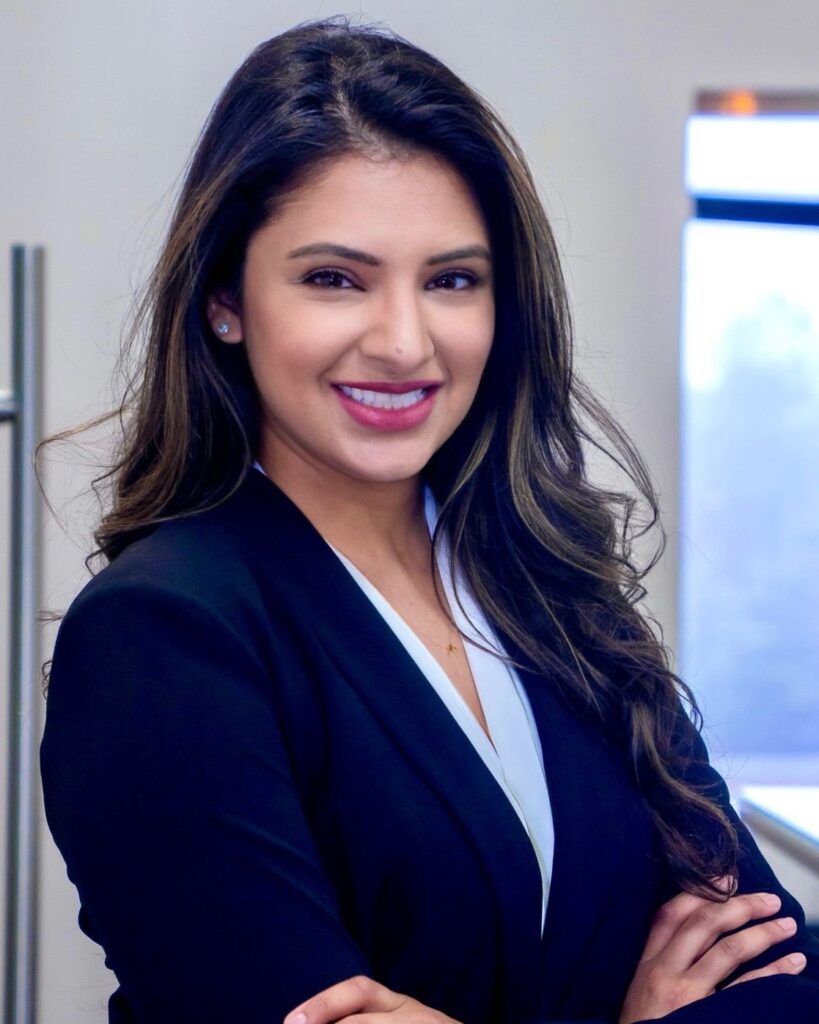




About Vandana Aggarwal
Vandana Aggarwal is the Vice President of Operations at Aggarwal Real Estate, her family’s commercial real estate investment and management firm. She brings a unique blend of strategic insight and operational excellence, shaped by her early career as a consultant at A.T. Kearney, where she advised Fortune 100 to 500 companies. A graduate of Georgia Tech, she also took a transformative detour from the corporate world to spend a year in India teaching yoga—an experience that continues to influence her leadership style today. At the core of her work is a deep commitment to family and a passion for building strong, connected communities.
Timestamp:
00:00:00 – Introduction and sponsors: Vox Pop Uli & EV Remodeling
00:03:12 – From Georgia Tech to global consulting
00:04:23 – Leading strategy for Fortune 500 companies
00:06:11 – The role of vision alignment at the C-suite
00:08:01 – Sabbatical becomes family business overhaul
00:09:35 – Bringing operational excellence to a growing real estate firm
00:12:02 – A year of yoga, nature, and healing in India
00:17:03 – Hiking Kilimanjaro, testing limits, and expanding self-trust
00:18:52 – Navigating family dynamics inside a business
00:21:56 – Planning for leadership transition: siblings, strategy, succession
00:24:06 – Rebranding the business: from American Management to Aggarwal Real Estate
00:26:33 – Where AI fits (and doesn’t) in real estate operations
00:30:04 – Legal, leasing, HR, and marketing efficiency with tech
00:31:01 – Community-focused retail and experiential shopping centers
00:32:00 – Reflections on AI, journalism, and digital trust
00:32:57 – Closing thoughts
Podcast Transcript
00:00:00 – Rico Figliolini
Hi, everyone. This is Rico Figliolini, host of UrbanEbb. This podcast comes out of the city of Peachtree Corners, and we have a special guest today. And if I don’t mess up the name, it’s Vandana Aggarwal.
00:00:15 – Vandana Aggarwal
Absolutely. You can call me V, Rico.
00:00:15 – Rico Figliolini
I’m going to call you V, trust me. And I’m Rico Figliolini, so a bit of a long name there. But V is VP of Operations of Aggarwal Real Estate here, based in Peachtree Corners? No, Norcross.
00:00:30 – Vandana Aggarwal
In Norcross, yeah. Norcross, Georgia.
00:00:32 – Rico Figliolini
Yeah, yeah. Just off 85, and?
00:00:34 – Vandana Aggarwal
Jimmy Carter.
00:00:35 – Rico Figliolini
And Jimmy Carter.
00:00:36 – Vandana Aggarwal
We’re completing each other’s sentences already.
00:00:39 – Rico Figliolini
But where are we doing this? We’re doing this from one of our great sponsors, one of our two great sponsors, Vox Pop Uli. Was this tastefully obnoxious? Let me tell you, I asked them to do a corner cut for us, and this is perfect. So they have the Moxie logo and stuff. So they’re branding, right? Same way they can brand your stuff. They’ll put your logo on anything. They’ve done, I think, 6,000 vehicle wraps. They’ve done garments, obviously. They could do one-offs or they could do 1,000. They do trade show booths, wraps, everything. So anything you need a logo on, think of what object you want it on. They’ll figure it out for you. And if you’re doing, let’s say, 5,000 mailers and you want that database customized for each postcard, they could do that also. It’s called data. I forget what it’s called, but they can do that. They can work the data into the printing as well. So all customizable. Check them out, voxpopuli.com. Now, getting to something we were talking about, hands-on stuff, which is this also. This can’t just be done by machines, right? Although machines, you still need people. But EV Remodeling Inc., they are a remodeling company. They can do design to build. They can do whole house renovation. They can create your deck, your backyard gazebo. They can put a bathroom, kitchen, anything you want. EV Remodeling Inc. is owned by Eli and his family. Lives in Peachtree Corners. It’s based out of our city. They’ve done, I think, over 250 homes recently. So check them out, evremodelinginc.com. And I want to thank both of them for being great sponsors of ours. So, it’s always a long stretch doing that, but I’m glad to have you, V.
00:02:22 – Vandana Aggarwal
I’m happy to be here. Thank you for inviting me onto your podcast. Excited to chat with you.
00:02:25 – Rico Figliolini
Yeah, no, this is cool. Well, you know, I met you, where did I meet you at? I think it was the chamber.
00:02:30 – Vandana Aggarwal
Yeah, the Southwest Gwinnett Chamber event.
00:02:32 – Rico Figliolini
Yeah, and we were talking a bit, and I was like, damn, you know, I had my father owned a business, and he wanted his kids to be in it. None of us, none of us could go into that business. It’s a little difficult, different industry. It was a hard industry, plus my father was very patriarchal, very over-demanding. God bless him. He mellowed in age. But when you were telling me about your family, I mean, your father, your mother, your sister, your brother, and you, I mean, all in it. It’s amazing.
00:02:55 – Vandana Aggarwal
We’re all together. We’re the modern-day Brady Bunch.
00:03:03 – Rico Figliolini
I love it. Yes, that’s exactly it. But, let’s start a little bit. I mean, you were telling me, I mean, you came from a consulting world. You came where you were actually being paid a lot more than you’re being paid right now, actually.
00:03:12 – Vandana Aggarwal
I told my father he couldn’t afford me when he recruited me out. So I graduated from Georgia Tech in 2007. I actually did join his company right out of college for two years, learned a lot about the company. He actually had me go through a rotation in every department of the company to learn more about what we did, how we operated. And I think very quickly, it was also 2008-9 with a recession. But I was also very interested to learn how big companies operate. How can you take a small company at that time? We were much smaller than we are today and really understand how do you go from this, which is where everyone starts, right? As a new company to get to be one of the largest in the nation, in the world and see how they operate, how they grew it from, you know, a mom and pop business to this global enterprise. Consulting was a natural transition to learn about multiple companies, multiple industries. So transitioned into AT Kearney, which has now been rebranded as Kearney, and out of their Chicago office. So I was there for seven to eight years, almost eight years.
00:04:23 – Rico Figliolini
Entry-level position you got in?
00:04:24 – Vandana Aggarwal
Yeah, I went in as an analyst. The good thing with that experience was by the time I left, I was a senior manager with Kearney. I worked across 17 different companies in those eight years. So I got to experience how CPG companies, retail companies, transportation, IT, you name it, I’ve done it. In terms of the different types of industries I got to work with, worked with a lot of Fortune 100 to 500 companies at the C-suite level. So we were coming up with all kinds of strategy projects such as new market entries, mergers and acquisitions. A lot of what I ended up specializing in in those seven years was operational efficiency and growth strategy. So it was an amazing, I’m grateful for that learning experience, the you know the caliber of minds that you work with. You also get to experience what the C-suite looks like. How does the very top operate and then it goes from the top down right? So it is very much led at this very top leadership and you see how companies change in their culture the way they operate based on how the top is designed.
00:05:38 – Rico Figliolini
So did you see good and bad at the top?
00:05:41 – Vandana Aggarwal
Absolutely. And I’m not going to name names. But you learn a lot when you see how your CEO and your C-suite right below them, the culture they’re bringing into a company and their vision and their goals if they’re aligned, unaligned. Anyone that at the very top have different viewpoints of where the company has had it is where companies start to break apart, lose revenue, lose their you know people, which is very important.
00:06:11 – Rico Figliolini
Where did you see the pain point then? What was the common denominator I guess of those?
00:06:18 – Vandana Aggarwal
There’s no one common denominator, but if I had to kind of narrow in, it comes down to what is our five-year, ten-year trajectory? Where are we headed? As large companies grow, you’re not just in one industry. You’re not just doing retail shopping centers. You’re investing in all kinds of properties just to bring it back to our company. Similarly, a CPG company can make all kinds of products, so they have to decide what it is because you have to be concentrated on the right places. If you have a leadership team that is in alignment of what that ultimate goal is, right, then you have clear strategies and, you know, metrics you’re measuring your success against. So that was a big thing that I learned. Also just, you know, seeing how great leaders operate, right? Some of the best in the nation today, I got to be in the room with them and just to see how they lead is very important.
00:07:14 – Rico Figliolini
Did you see any family dynamics in any of those businesses?
00:07:20 – Vandana Aggarwal
No. You know, there may have been like a father-son duo, but when you’re looking at the very top, I won’t say it was like all in the family, right? You know, and it also becomes the size of a company, right? You know, when you get to an international scale, you’re not always blessed that every person in your family has the right skill set and experience to fill each role on that C-suite.
00:07:46 – Rico Figliolini
I’m just thinking Trump for some reason. Every kid has a job.
00:07:51 – Vandana Aggarwal
Every kid has a job.
00:07:52 – Vandana Aggarwal
You had the accent, right?
00:07:54 – Rico Figliolini
Pretty much, I guess. So after the C-suite or expansion, you traveled a lot too, I think, right?
00:08:01 – Vandana Aggarwal
I did, yeah. So after my seven, eight years in consulting, I was reaching 30. And Shiv, my father, came to me and he said, you know, you’re doing this for a lot of outside companies. Why don’t you help us grow and bring your expertise home? And I said, look, I’ll take a sabbatical. Let me assess the company. And after that period where I took a short sabbatical to come look at how we were operating, I said, I can give you three years. I said, you can’t afford me, but I’ll give you three years of my time. And I said, I think it’ll be the right, it was the right time in the company. We were investing very heavily. We were bringing in a lot of new square footage into the company, and we weren’t designed to manage it. So we as a company, as you know, we are the investors. We have an in-house management company, an in-house leasing company. So as we acquire new properties, our team does the management for those properties in-house. We don’t provide third-party services today. And we do the leasing in-house. But at that time, when he, you know Shiv started we had one or two and now we’re at 50 shopping centers plus and other investments that we have. And there’s a very different way you operate you know and how do you how does the CEO go from being an operator to where he’s overseeing it, but he’s not into the weeds right? So he has create a system for that to happen right? You have to have standard operating processes for your property managers, your accounting team, your marketing team.
00:09:35 – Rico Figliolini
And you quite didn’t have that before.
00:09:37 – Vandana Aggarwal
We didn’t, no. And, you know, and I think that’s why he wanted to bring me in is because my strength is operations and I love it. I love going into messy places and cleaning them up.
00:09:49 – Rico Figliolini
Is that what you did when you were a consultant?
00:09:51 – Vandana Aggarwal
A lot of what I was concentrating on at the end of my consulting career, yes. So I did a lot of operational efficiency work. So we’d go in, assess the way companies were designed. And we’d interview hundreds of team members to understand what their role is. You know, what are they responsible for? How are they delivering? What are they measuring for success? And then we’d redesign the way they did that based on, again, bottom line, what are your ultimate goals for the company?
00:10:21 – Rico Figliolini
So you had to understand that before you got to that point. And you’re not making the decisions, the C-level.
00:10:29 – Vandana Aggarwal
Present, right? And similarly even with Shiv, when I first joined, I said, look, this is how I think we need to redesign the company from a bottoms-up perspective based on ultimately our goal of growth, doubling, tripling in size over the next ten years. And I think this is where the father dynamic came in. I guess he trusted me. And he said, do it. He just said, do it. And it was beautiful because right when you’re with large companies, it’s a lot of time before you get. Those decisions made and that trust, right? And so it was great. And he said, yeah, just put it into place.
00:11:07 – Rico Figliolini
See, that’s a great dad, actually. Some dads would be like, I don’t know about that daughter or son or whatever.
00:11:16 – Vandana Aggarwal
It did take time, though, like to ultimately, he was in the operation so heavily. And, you know, until today, I’m still like, step up, step up. Like, I need you to not get into the weeds. Like I think at that time we had tenants calling him, maintenance guys calling him. Like every little and big problem would go through his cell phone. I said, you’re too smart and you’re such a good investor. This is not your skill set. You shouldn’t be managing this. You need to bring people on who are expertise in this area. And I said, you need to be focused on like the larger plan.
00:11:51 – Rico Figliolini
This way you can grow it better.
00:11:51 – Vandana Aggarwal
Which I think has been very successful over the last eight years I’ve been with him now.
00:11:57 – Rico Figliolini
So before you got to him, though, you were traveling a bit internationally as well?
00:12:02 – Vandana Aggarwal
Yeah, yeah. So this is an amazing year. I was very burnt out. By the time I left consulting, I was working 70 to 80-hour weeks, traveling Monday through Thursday, if not more than that, of the week. So I told Shiv, I was like, I’m going to take a month. I’m going to go to India, get my yoga certification. No intention to teach at the time. I just said it’d be a great one-month retreat. And I was up in the mountains like Himalayas and India in a city called Dharamshala. Beautiful place. One of my favorites in the world. And I just, I think I needed it for myself emotionally, mentally to take that break. So I turned one month into one year. I didn’t know it was going to be a year.
00:12:49 – Rico Figliolini
In that same city? In that same town?
00:12:50 – Vandana Aggarwal
Yeah, so I ended up the school that I had gotten my certification with. I asked them, I was like, do you mind if I hang around for a little while? Like very casually, I’m like, you know, I’ll pay for my room and board, but I just want to be around this group and this energy. And they said, well, if you’re going to be here, why don’t you intern? And they’re like, room and board is free if you intern. I was like, sure. You know, not thinking what it was leading to. This is like that beauty of the universe coming into play. Yeah, so I started teaching, ended up loving teaching. So then I ended up teaching the 200-hour yoga training course. And I was in Dharamshala for four months. And then I moved down to Goa, their Goa campus for another six.
00:13:30 – Rico Figliolini
Where is that? Goa?
00:13:32 – Vandana Aggarwal
Goa? It’s in southern India on their west coast. It’s a beach town. Yeah. So I had the mountains and the beach. But I’m a mountain girl. I’m a hiker. But no, it was a beautiful experience. Very different from anything I’ve done with my career, right? But I became a yoga teacher for a year.
00:13:52 – Rico Figliolini
Did that clear your head? Yoga, they say, can do that, right?
00:13:53 – Vandana Aggarwal
Yeah, it’s all the tools of yoga, right? The meditation, the breath work, really getting internal, going in, right? Just going inwards, being quiet, which we don’t have. We have a lot of noise in our life today, you know? And naturally, right? Between family life, work life, social, and then just all of the noise from everything else right? Like we’re sitting here and I can hear the cars right? So you know that difference was when I was sitting there, I could hear the ocean waves and so there’s something very healing in nature naturally. So it was the tools mixed with nature and I still think nature has a very strong healing power on us. So whenever I can, I try to get out on a mountain and by the ocean. But yeah no it was it was a beautiful experience but it did bring a level of calmness into the way I approach things. It changes your perspective of you know at the end everything’s okay. No matter what you’re going through it’s temporary you’re, and everything that’s happening to us is happening to us for the good. We don’t know it, sometimes it seems like a bad situation in the moment, but ultimately you know, universe, God, whatever you believe in is at play to bring you something better in your life. And you just have to step back to understand what is it delivering us.
00:15:19 – Rico Figliolini
I like the way you think. My wife every once in a while would say, aren’t you upset about that? I’m like, I think come tomorrow, it won’t mean anything. There’s no point in, just relax. Not everything, two days later, it’s not as important as it seemed at that moment.
00:15:37 – Vandana Aggarwal
Yeah. And it’s not just that it’s not as important. It’s also like…
00:15:41 – Rico Figliolini
In perspective?
00:15:42 – Vandana Aggarwal
It’s, what am I gaining from this? Like, what can I gain from this? Oftentimes when, you know, a lot of things happen, yeah, like you get hurt or, you know, it’s like in relationships, right? Or if you have a bad business deal, right? It’s like, hey, how am I growing, right? And I think that’s what makes life very exciting, right? Otherwise, if you’re always living on a high, is it a high?
00:16:06 – Rico Figliolini
Yes. So I’m thinking you were a consultant for seven or eight years. 80 hours a week. And all of a sudden you’re doing yoga on the mountains of India. It’s just like, it’s almost like a movie. It’s almost like…
00:16:18 – Vandana Aggarwal
Eat, pray, love?
00:16:19 – Rico Figliolini
Yes.
00:16:20 – Vandana Aggarwal
It was my eat, pray, love moment for a year.
00:16:23 – Rico Figliolini
That’s amazing.
00:16:24 – Vandana Aggarwal
No, you meet amazing people, but I think we were meant to meet everyone that we come in interaction with on a daily basis. You naturally have a connection. There’s a universe at play, and we were meant to cross paths and learn something from each other, gain something from one another, give to the other person. And I think you just have to look at life that way.
00:16:48 – Rico Figliolini
I definitely think along that way. I mean, I definitely think each of us nudges each other in a crowd a little bit. That one nudge can set you off going in a different direction. So I totally believe in that. So you joined your dad. Yes. And you’re, so actually, even before we get there, so yoga, but what other interests have you been?
00:17:03 – Vandana Aggarwal
Yeah. So, I mean, I’m an avid hiker. I’ve done recently in the last few years, I’ve climbed Kilimanjaro. I did the Machu Picchu trail. I’ve done a few 14ers out in Colorado, but I like to test myself physically. You know, just, again, it comes down to how do we find that push within us past our comfort zone? So is this a physical inability or is it a mental constraint? So to get past that mental constraint of discomfort and then really push yourself to the next level and say, I can achieve something. It’s not going to be easy. So to me, if I’m on a hike and it’s not hard, I’m like, well, was it a hike? Like it didn’t test me, but no I think, you know.
00:17:55 – Rico Figliolini
You should do the Appalachian Trail. That’s like 2000 plus miles.
00:18:03 – Vandana Aggarwal
I know. And it is, you know, it’s not just like the hiking part. It is like living out in nature and, you know, sleeping in uncomfortable conditions. Yeah. Walking in the rain. It’s cold. I think the last day of our Kilimanjaro hike, it was negative 20 degrees up in the mountain and my eyelashes were frozen and I couldn’t feel any part of my body. And, you know, and it tested my breathing. And there is that element of push yourself to the point that it’s not your ego anymore. Like if your body’s saying stop, you have to stop as well and respect your body. But yeah, to really test yourself.
00:18:38 – Rico Figliolini
To circle all that back now, you’re back home. You’re working with your father and your family. A lot of businesses grow or die because of family. If it’s a family business, right?
00:18:52 – Vandana Aggarwal
Absolutely, yeah.
00:18:53 – Rico Figliolini
So you have your highs, your lows, your, sometimes you don’t get along. Sometimes decisions are split. People get upset with each other. So you’ve been at your highs and lows physically and mentally doing other things. Has that helped you in some ways? Not that you’re having a bad time with family. Because it sounds like you all fit just fine, like the Brady Bunch.
00:19:15 – Vandana Aggarwal
Let’s keep it that way. No, I mean, there’s multiple dynamics at play. It is a family business. My father is also my boss. My siblings are also my friends and my coworkers. And it’s about no matter how hard you try, you cannot separate those relationships. There is an interplay of all of it when you spend eight to nine hours a day together. But we all have, again, a common goal for the company. And then a common goal for our personal relationship. So when we sit down, we keep in mind that we like each other and we want to keep it that way. Like very simply put, that’s first and foremost for me especially. Even when Shiv had brought me in, he said, oh, can you manage everyone? And I said, I’ll manage everyone but my brother and sister. I said, you know, like I won’t jeopardize the relationship I have with them as a sibling by being their manager. Especially because I said that’s your job like good luck. But not just that it’s you know we all have different skill sets so I said how do I manage my brother who is a genius he’s a CPA by trade you know like I can’t tell him how to run the financials of this company like he’s supposed to teach me that right? And same way I teach him that. My sister has a master’s in marketing right? She is by far the most social, likable person you’re going to meet, and she knows how to work with people. I said, she needs to teach us that. So I think we’re lucky that each of us, and this is, I think, rare, where you have three kids and each one of them has their own skill set. That, I think, helps us stay in business and we see ourselves foreseeably into the long-term future being in business together is because we each bring something very unique to the table. Ultimately we value the relationships that we have on a personal level as a family above all else right? And then you know the element of like, how does the yoga experience a hiking experience teach us. That’s, it’s not specific to anyone’s situation, I think it’s a baseline of who you become right? The foundation. Like it teaches you patience, it teaches you again, everything is temporary so let’s not get overly attached emotionally or get upset or too joyful, even like, let’s just stay neutralized on any situation because it will end. And then the next one will come up and kind of flow with the ebbs and flows of the ocean. You, you flow with everything that comes with you, comes your way at work, at home. But yeah, I mean, we do sit down as a leadership team. I, my father and my siblings and I, and we talk about, hey, we separately do the exercise. Where are we going to be in five years? What role do we play in that journey? And thankfully, all of ours are very similar in what our goals are. And then we have different skill sets that we bring. So even as we design the future of the company in a moment where my father is not at the head of the table, we’re working on that redesign work. But it’s very conscious. It’s very intentional. Again, we all step back and say, hey, look, how do we maintain, how do we solve problems? Because like, you know, we were talking about how tomorrow we may not agree on something, a big decision. What are we investing in? Come back to, you know, right now Shiv gets to make an ultimate decision because he’s the one leader at the top. Tomorrow it’s going to be three people at the top. How do you deal?
00:23:04 – Rico Figliolini
So is there an exit plan for your dad? Well, not an exit plan.
00:23:09 – Vandana Aggarwal
Not an exit plan. He already has. I think he, you know, he’s gone from, he’s the hardest working person I know. I get that from him. We’re addicted to work.
00:23:18 – Rico Figliolini
80 hours a week.
00:23:21 – Vandana Aggarwal
We love working. You know, this company is his baby. I think I’ve adopted it at this point and we all have. But, to stay mentally sharp, to stay alive, you have to keep working. You have to keep doing something. You have to be working towards something that brings you joy and purpose. And I think, you know, he stepped back to take time towards a lot of his nonprofit work, community work that he’s very much engaged with. But he’s still at the top. He’s still running, you know, his, you know, he’s, you know, not slowing down. You know, we’re constantly growing. We’re growing this year in a large scale, which is amazing, and he’s leading that charge.
00:23:59 – Rico Figliolini
How many properties do you own?
00:24:02 – Vandana Aggarwall
Today we have 50 shopping centers and then a few other assets.
00:24:06 – Rico Figliolini
Is that like 3 million square feet or something? 4 million?
00:24:10 – Vandana Aggarwal
Yeah, over 700 tenants. But, you know, when we sat down a few years ago, we rebranded. Aggarwal Real Estate didn’t exist until two years ago. It was American Management Services. And we had a rebranding effort because we said we want the company’s name and the brand to represent who we are.
00:24:33 – Rico Figliolini
I like that, by the way.
00:24:35 – Vandana Aggarwal
Yeah, it needs to mean something. And we were also proud of what our father has achieved, right? He’s given us this beautiful life that we get to help grow upon. So we said it needs to pay homage to him. So we said, let’s make it Aggarwal Real Estate, ARE. And then as we were deciding what that vision is, we’re a family. In the company, we are a family, not just the four of us, but all of our staff, our team. We don’t, you know, we don’t look at them separate from who we are. And so we said our mission as a company is building communities as a community. And it talks about, hey, in all of the real estate work we’re doing, we try to make sure all of our properties are beautiful. Our tenants are happy. They have direct access to each of us in the company. And on top of that, as a company, we are a community within ourselves because we can’t create them until we are one. So it was very intentional to who we already were, but putting it into brand terms.
00:25:37 – Rico Figliolini
It’s amazing. All that property, tenants. Can’t imagine father tech can send text messages on all their problems, if they have any.
00:25:45 – Vandana Aggarwal
He’s a brilliant man.
00:25:45 – Rico Figliolini
You could be too possessed on that stuff. We want to be cognizant of our time together.
00:25:55 – Vandana Aggarwal
Absolutely.
00:25:57 – Rico Figliolini
So the next subject really was going to be about also AI, because everyone’s talking about AI. We were talking about that before the show started, before we started recording, which was kind of funny because V was asking me if we edit anything. And I was like, no, straight through.
00:26:11 – Vandana Aggarwal
I wanted to see if I could say a few things and then have it taken out of this conversation.
00:26:13 – Rico Figliolini
Nope. Nope. Doesn’t work that way. So, but ChatGPT, AI, that’s all. I mean, you know, could I create a bot to edit this? Probably. But there’s so many things we use in our lives. And you’ve been talking about how it would affect your business. Nevermind the consulting work you did.
00:26:33 – Vandana Aggarwal
Yeah. I mean, the consulting world is, I mean, it depends on the industry, the type of work you’re doing. In real estate, I’ve put a lot of thought behind this. There’s a lot of conversations happening across every industry, every sector, whether it’s education, automotives, real estate, et cetera. Everything’s being discussed. How is that changing the future? How do we incorporate it to be more efficient, right? Be the best in the industry that we can be or operate better. And so for me it’s again comes down to that operations element that I think about like, how do I incorporate it for a company that’s a medium-sized real estate firm today as we become a large company, a bigger player in the market. And people are very important in real estate right?
00:27:17 – Rico Figliolini
Talk about editing?
00:27:20 – Vandana Aggarwal
I was telling you, we should bring them into the podcast.
00:27:27 – Rico Figliolini
We’re going to run a little longer on this.
00:27:36 – Vandana Aggarwal
But let’s take retail shopping centers. This is brick and mortar. I did a paper actually for a large mall retailer back in my consulting days on how the title of the paper was, is brick and mortar dead? And, you know, full circle, I am fully dedicated to brick and mortar, retail, office, multifamily now. But you still need people to clean up your properties, fix your maintenance issues. We were talking about roofing, plumbing, electrical. That is hands-on work. You know, today there is, it’s going to be a long time before there’s a robot that comes in to do that. There will be. I don’t know. I do not see that in 10 years to say we’ve got roofers that are robotic drones that are going to come fix my roof problems.
00:28:24 – Rico Figliolini
Zumbas, they’re going to run around the roof or something.
00:28:26 – Vandana Aggarwal
That’s actually genius. A Zumba for my roof.
00:28:31 – Rico Figliolini
Why not? Attach it to the right thing.
00:28:33 – Vandana Aggarwal
But so those are very people-oriented roles today. Technology will advance how quickly it’s done or how well it’s done. But you’ll still need someone to operate the machinery of it and everything.
00:28:49 – Rico Figliolini
Just not as many.
00:28:50 – Vandana Aggarwal
Yeah. Construction, similarly, right?
00:28:54 – Rico Figliolini
Unless you 3D print a house. I’m sorry.
00:28:56 – Vandana Aggarwal
No, it’s true. It’s true. There’s so many options. I’m thinking 10 years now. I’m not going to have a 3D printer making the metal framing for my new construction project. You know, or installing the sheetrock, it does probably speed up the process, right? There will be machinery to help with that, a lot of AI development in that way. It’s a lot at an office administrative level, right? The speed in which you’re processing invoices, the speed in which you are, you know, getting payments taken in. Today, I would say as far back as right before COVID, we were still accepting checks for money. Now it’s all online. Like we do not accept money coming into the office, or it’s very limited to what we do, right? So that’s AI, if you think about it, right? The ability to pay online.
00:29:42 – Rico Figliolini
QuickBooks Online uses AI now, you can enable it.
00:29:47 – Vandana Aggarwal
So we’ve been using it for many years. The advancement of it has been a little bit slower, and now it’s sped up. Marketing, we were just talking about how you created a flyer on ChatGPT, was it?
00:30:00 – Rico Figliolini
I won’t talk about the student that’s helping us out here and how they use AI.
00:30:04 – Vandana Aggarwal
No, AI in school, right? But yeah, it’s an AI processor for my HR roles, right? Instead of reading 100 resumes, it’s going through the system to filter them out. Whether it’s writing contracts, I won’t lie. Legal jargon is coming out of ChatGPT today. And so it’s speeding up the way we’re doing work. But my legal team probably, and they won’t say it, should be using AI if they’re not. To help create some of this work right? So it’s like these companies are still going to be needed, but the way that they’re able to respond to us at a quicker, everything would just happen faster right? From typewriters to computers, everything.
00:30:49 – Rico Figliolini
Especially if they know that they just did a lease from you for this property in Texas, that we need three more leases done for three other places, it’s not going to be that much different, right? It’s a template.
00:31:01 – Vandana Aggarwal
It’s coming out a lot faster. Yeah, I mean the negotiations, that’s a people-to-people thing right? So I think thankfully in the real estate world we’re still going to need people. We’re still going to need buildings right? The way built, we were just talking about how a retail shopping center is no longer just for shopping. It has to be for entertainment. It has to be for bringing families in and giving them more than just, hey, go into a TJ Maxx and buy something, right? It’s like, what else are you getting when you’re at that center? Whether it’s a play space or events, we’re starting to do more events at our shopping centers. So it’s, again, serving the community.
00:31:39 – Rico Figliolini
We’re seeing that more. More of that happening. We could go on and on here.
00:31:46 – Vandana Aggarwal
Chatting with you.
00:31:46 – Rico Figliolini
Yeah, and we should probably do one on either AI in the marketplace. Or maybe a panel discussion on something similar.
00:31:51 – Vandana Aggarwal
Yeah, overall, yeah. That would be exciting.
00:31:55 – Rico Figliolini
Yeah, I think that would be cool.
00:31:56 – Vandana Aggarwal
I think it’s interesting to learn about kind of where every industry is heading. It impacts all of us.
00:32:00 – Rico Figliolini
For sure. I mean, the magazine business, I mean, it’s all like we have certain, we have AI rules. But, you know, AI is still being used to degree to research things. And to do certain things like that. You know, hopefully journalism isn’t just handed over. They do say 40% of the internet is AI written. So, which is kind of incestuous almost because it’ll just feed on itself at some point.
00:32:27 – Vandana Aggarwal
There’s a whole discussion about the validity and the trust behind digital content. In the next few years. I think it’s going to diminish.
00:32:35 – Rico Figliolini
Oh, yeah. I mean, I’m seeing videos now and it’s just like, it just looks so real. And you could not tell the difference, even voice-wise.
00:32:42 – Vandana Aggarwal
And that’s scary to think. It’s like, how do you trust what you see?
00:32:47 – Rico Figliolini
So on that note, and since this is not edited, so this is right from the beginning. So this is all true. But I want to thank everyone. I want to thank you, V, for being with me.
00:32:57 – Vandana Aggarwal
Thank you so much for having me. This was a great conversation.
00:33:01 – Rico Figliolini
It went by way faster than some of these go. So this is a great discussion. Thank you, everyone. I appreciate you for joining us. Thank you for Vox Pop Uli for the studio look and for letting us do it here, for being a sponsor and for EV Remodeling. Also, I want to thank Jeremy Pruitt behind the camera who has taken care. He’s a Paul Duke student. And it wasn’t him that I was talking about before, by the way. But all the work he’s done on the back end on this. So thank you, Jeremy. So thank you all. Thanks for being with us.
Related
Read the Digital Edition
Subscribe
Keep Up With Peachtree Corners News
Join our mailing list to receive the latest news and updates from our team.
You have Successfully Subscribed!

“Geek Culture” Shines at 2025 MomoCon

Vox-Pop-Uli Launches RED Initiative for Veterans’ Support

From Zero to Accredited: Dunwoody’s Billy Grogan on Starting a City Police Department [Podcast]

City Collaborates with DNR for Deer Overpopulation Solutions

More Than Badges: Why Community Culture Drives Great Policing [Podcast]

The PCBA Awards $500 to Light Up The Corners at After-Hours Event

The City and PCBA Welcome Ride Lounge with Ribbon Cutting Ceremony

Peachtree Corners Festival Awards Debbie Mason Drama Scholarship for 2025

Eric Christ: Upcoming Elections Update

The Forum Welcomes [solidcore] with June 7 Grand Opening

More Than Badges: Why Community Culture Drives Great Policing [Podcast]

The City and PCBA Welcome Ride Lounge with Ribbon Cutting Ceremony

From Zero to Accredited: Dunwoody’s Billy Grogan on Starting a City Police Department [Podcast]

Mustache The Band Set to Play the VoxStage on June 14

City Collaborates with DNR for Deer Overpopulation Solutions

Peachtree Corners Festival Awards Debbie Mason Drama Scholarship for 2025

Light up the Corners [Video]

Capitalist Sage: Business Leadership in Your Community [Podcast]

Cliff Bramble: A Culinary Adventure through Italy

Top 10 Brunch Places in Gwinnett County

A Hunger for Hospitality

THE CORNERS EPISODE 3 – BLAXICAN PART 1

Top 10 Indoor Things To Do This Winter

The ED Hour: What it takes to Remove Barriers from Education

Peachtree Corners Life
Topics and Categories
Trending
-
Podcast4 days ago
More Than Badges: Why Community Culture Drives Great Policing [Podcast]
-
Business5 days ago
The City and PCBA Welcome Ride Lounge with Ribbon Cutting Ceremony
-
Fitness3 days ago
The Forum Welcomes [solidcore] with June 7 Grand Opening
-
Elections and Politics3 days ago
Eric Christ: Upcoming Elections Update







